#legendary record producer
Explore tagged Tumblr posts
Text
youtube
Music Legend Quincy Jones Has Passed Away At Age 91
Quincy Jones, the legendary music producer and composer, passed away at the age of 91 on November 3, 2024.
#viral trends spot#quincy jones#Quincy Jones death#legendary record producer#music industry icon#Grammy-winning artist#Michael Jackson collaborator#jazz musician#film composer#music arranger#television producer#African American music pioneer#Thriller album producer#We Are the World producer#Frank Sinatra collaborator#music industry influence#Quincy Jones legacy#pop music history#Quincy Jones career highlights#Quincy Jones Has Passed Away At Age 91#Youtube
0 notes
Text
10 Fascinating Facts About Black Irish History

When people think of Irish history, they often imagine fair-skinned Celts with red hair. But Ireland has a long and rich history of Black presence, dating back centuries. From African merchants in medieval Ireland to Black Irish revolutionaries, here are ten key facts that highlight the deep and often overlooked connections between Black history and Ireland.
1. Black People Have Been in Ireland Since at Least the 3rd Century
Historical records suggest that people of African descent were present in Ireland as early as the Roman era. The Romans never invaded Ireland, but trade and migration brought people from North Africa and the Mediterranean to Irish shores.
2. The First Known Black Irishman Was a 9th-Century Scholar
One of the earliest recorded Black individuals in Ireland was Firmanus, a scholar who lived in the 9th century. He was described as “a man of Africa” who studied and taught in an Irish monastery. This suggests that Ireland had connections with the wider world far earlier than many assume.
3. Irish Pirates and African Connections
During the 17th century, Irish and African histories intertwined through piracy. Irish pirates and privateers frequently raided North African coasts, capturing people to sell into slavery, while some Irish were also taken by Barbary pirates and enslaved in North Africa.
4. Olaudah Equiano, a Former Slave, Was a Prominent Abolitionist in Ireland
Olaudah Equiano, one of the most famous formerly enslaved Africans and an early abolitionist, visited Ireland in the 1790s. His autobiography, The Interesting Narrative of the Life of Olaudah Equiano, was widely read in Ireland and helped build support for the abolitionist movement.
5. Ireland Had a Role in the Transatlantic Slave Trade
Although Ireland never had large-scale slavery like the Caribbean or the U.S., Irish merchants and settlers were involved in the transatlantic slave trade. Cities like Cork and Dublin profited from goods produced by enslaved Africans, and some Irish individuals owned plantations in the Caribbean and America.
6. Frederick Douglass Found Refuge in Ireland
Frederick Douglass, the famous African American abolitionist, visited Ireland in 1845 to escape the dangers of being recaptured in the U.S. He was deeply moved by the poverty he witnessed during the Irish Famine and found an ally in Irish leader Daniel O’Connell, who was a vocal opponent of slavery.
7. The Black Irish of Montserrat Are Descendants of Irish and African Slaves
The Caribbean island of Montserrat has a unique population of Black individuals who proudly identify as “Black Irish.” This stems from the 17th century, when Irish indentured servants and African slaves were forced to work on plantations together. Montserrat even celebrates St. Patrick’s Day as a nod to its Irish heritage.
8. Phil Lynott, the Black Irish Rock Legend
One of Ireland’s most famous Black figures is Phil Lynott, the frontman of the legendary rock band Thin Lizzy (“The Boys Are Back in Town”). Born in 1949 to an Irish mother and a Guyanese father, Lynott helped shape rock music and is celebrated as an Irish music icon.
9. Emma Dabiri is Leading Conversations on Black Irish Identity
Irish-Nigerian author and academic Emma Dabiri has been at the forefront of discussing Black identity in Ireland. Her books, including Don’t Touch My Hair, explore race, culture, and the often-overlooked history of Black people in Ireland.
10. Ireland Is Becoming More Diverse Than Ever
Today, Ireland is home to a growing Black community, with many people of African descent contributing to the country’s cultural, political, and artistic landscape. The 2022 Irish Census recorded over 70,000 Black Irish residents, showing that Black history in Ireland is far from over—it’s still being written.
Black Irish history is rich, complex, and deeply interwoven with global movements of people, power, and culture. Recognizing this history helps break stereotypes and highlights Ireland’s long-standing connections to Africa and the African diaspora.
Did any of these facts surprise you?
#black Irish#ambitious women#beautiful women#beauty#glow society#the glow society#fit beauty#health#self love#self improvement#self care#irish language#irish#irish mythology#irish music#notre dame fighting irish#irish history#irish girl#irish politics#irish art#irish literature#black forest#black history#black history month#black woman#black people#black man#black women#black beauty#black bikini
431 notes
·
View notes
Text
Dave Grusin - The Goonies - Fratelli Chase 1985
The Goonies is a 1985 American adventure comedy film directed and co-produced by Richard Donner from a screenplay by Chris Columbus based on a story by Steven Spielberg and starring Sean Astin, Josh Brolin, Corey Feldman, and Ke Huy Quan. In the film, a group of kids who live in the "Goon Docks" neighborhood of Astoria, Oregon, attempt to save their homes from foreclosure to an expanding country club and in doing so they discover an old treasure map that takes them on an adventure to unearth the long-lost fortune of One-Eyed Willy, a legendary 17th-century pirate, while being pursued by the Fratellis, a family of criminals who are after the treasure as well.
The film grossed $125 million worldwide on a budget of $19 million. Critics reviewed the film positively and it has since become a cult film. In 2017, the film was selected for preservation in the US National Film Registry by the Library of Congress as being "culturally, historically, or aesthetically significant". Special anniversary events for the film, hosted by the city of Astoria, have drawn about 10,000 to 15,000 visitors. The home used for the Walsh family has become a tourist attraction, receiving between 1,200 and 1,500 visitors a day during the summer of the 30th anniversary. As a result, in August 2015, the residents and owners of the home, their neighbors, and the city of Astoria took steps to limit public access to the home.
The main theme, "Fratelli Chase", has been used in numerous trailers, such as Innerspace, Scrooged, and Guarding Tess, and was re-recorded by compser Dave Grusin and the London Symphony Orchestra for the album Cinemagic. The score makes liberal use of the Max Steiner-composed theme from Adventures of Don Juan; the character Sloth is seen as an Errol Flynn fan and aspects of his movies are referenced throughout The Goonies as a result. Dave Grusin's score was unavailable for 25 years, until soundtrack label Varèse Sarabande released it on CD in March 2010 for the film's 25th anniversary in a limited edition of 5,000 copies. The company reissued the score soundtrack on CD as a wide release in June 2019, but with the previous CD's four bonus tracks omitted.
87,4% never say die!
youtube
454 notes
·
View notes
Text

1969 Ford Mustang Boss 302
This iconic 1969 Ford Mustang Boss 302 is a true muscle car legend. Its aggressive styling, powerful engine, and legendary racing heritage make it one of the most sought-after classic cars of all time.
10 Amazing Facts About the 1969 Ford Mustang Boss 302:
1. Racing Dominance: The Boss 302 was originally designed for racing, and it quickly became a dominant force in SCCA Trans-Am competition.
2. Powerful Engine: Under the hood, the Boss 302 featured a specially tuned 302 cubic inch V8 engine that produced an impressive 290 horsepower.
3. Distinctive Styling: The Boss 302 featured unique exterior styling, including a revised front grille, hood scoop, side stripes, and rear spoiler.
4. Limited Production: Due to its racing heritage, the Boss 302 was only produced in limited numbers, making it a highly collectible car today.
5. Investment Opportunity: Boss 302 Mustangs have a strong track record of appreciating in value, making them a desirable investment for car collectors.
6. Cultural Icon: The Boss 302 has appeared in numerous movies, TV shows, and video games, cementing its status as a cultural icon.
7. Performance Legend: The Boss 302's reputation for performance and handling is legendary. It's a car that delivers an exhilarating driving experience.
8. Nostalgic Charm: The Boss 302 evokes a sense of nostalgia and takes you back to the golden age of muscle cars.
9. Timeless Design: The Boss 302's styling is so timeless that it still looks stunning today. It's a car that will never go out of style.
10. Pure Driving Joy: There's nothing quite like driving a classic muscle car like the 1969 Mustang Boss 302. It's a car that inspires confidence, excitement, and a sense of pure driving joy.
621 notes
·
View notes
Text
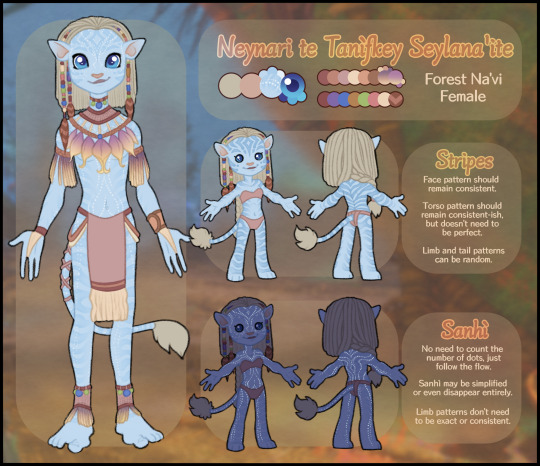


wooooo they have proper refsheets
massive lore dump under the cut
Might as well start with Neynari. Probably the most striking thing about her visually is that she has a condition called leucism, which causes an underproduction of pigment. In Neynari's case, her leucism is a random mutation that resulted in the malfunction of her pigment-producing cells, rather than a genetic trait inherited from her family. Needless to say the clan was quite surprised when she was born hrh
Speaking of which, Neynari was born in the Aranahe clan to a couple by the names of Seylana and Vontxu. She was an only child and has an especially close relationship with her mother. Her father, Vontxu, was very quiet and reserved; he rarely spoke and was difficult to get to know. Seylana found his soft demeanor charming, but while Neynari loves her father and knows he loves her too, his personality made it harder for her to bond with him, so she was never quite as close to him as she was to her mother.
Her pale skin makes her a poor hunter--prey can see her coming from a mile away--but she more than makes up for her lack of hunting ability with excellent craftsmanship. Growing up in the Aranahe clan she is of course well versed in weaving and dyeing, but her true passion is beading. She absolutely loves making beads of all varieties and incorporating them into her weaving projects. Vontxu is actually the one who first taught her how to make them, and it was one of the few activities she felt she and her father could bond over. She used to sit for hours in the weaver's den with him, not speaking, just carving beads to their hearts' content.
One day a group of Aranahe artisans, Neynari among them, set off on a trading route to visit the Anurai clan. Neynari knew the Anurai clan also had a reputation as skilled artisans and was keen to compare their crafts. It was on this trip that she met Se'txelu...
(rewinds tape recorder) alright let's talk about Se'txelu now hrh. I mentioned how Neynari has a condition called leucism. Well, Se'txelu has the opposite: melanism (or I guess for a Na'vi it would be called cyanism). So while Neynari's body underproduces pigment, Se'txelu's overproduces it. Unlike Neynari whose condition was a random mutation, Se'txelu's is one that I headcanon as a rare but established recessive trait among his clan, the Anurai (actually google tells me that irl melanism is dominant but shhhhhh this is imaginary alien version I can do what I want with it lol). This Pandoran version of the condition, in my headcanon, requires just the right combo of genes to show up in the phenotype, so while several of the Anurai are carriers of the gene(s), it's very rare to have more than two or three indivduals who actually display it living in the clan at the same time, and sometimes there are none at all. At the time of this "story" there are only two: Se'txelu himself, and the current tsahìk, Awlun (who happens to be his great-aunt.) Before them, the most recent person to have it was Se'txelu's great-grandfather.
The Anurai don't use human terms like melanism or cyanism of course; they refer to this condition as txonleng (shortened from txonä ta'leng, meaning "skin of night"), and because the dark color resembles the hide of the mighty palulukan which the Anurai canonically revere, it is generally believed that individuals born with txonleng are blessed by Eywa and destined to be legendary hunters, especially nocturnal hunters...which there may be a sliver of truth to, since they are naturally better at blending into the shadows.
In Se'txelu's case, though....well, he is good at camouflage, but alas, he's also kinda clumsy, which kinda cancels out any stealth bonus granted by his condition 😅 Despite his clumsiness, he is still a decent hunter at least, albeit a long ways off from "legendary" status (uh oh, potential source of angst for this usually happy-go-lucky dork).
When the Aranahe artisans visited his clan to trade, Neynari immediately caught Se'txelu's attention. He'd never seen anyone who looked like her before, and on top of that, she was quite beautiful. He was infatuated immediately. Lucky for him, she took notice of him too (they both kinda stand out in a crowd lol). Now, while Se'txelu had never seen anyone with leucism like Neynari, he had met two other people with his own condition, txonleng—his great-grandfather (although his memories of him are hazy since he was quite young when he died (of old age)), and Awlun (who of course is still alive and kicking)—so though his condition was rare he had never really felt alone because of it. Neynari, on the other hand, had never seen another Na'vi who wasn't standard blue, so meeting someone else who stood out like that was shocking and intriguing.
The Aranahe trading party stayed with the Anurai for about a week. Se'txelu tried to work up the nerve to actually talk to Neynari. One day, she noticed him up in a tree and waved at him. Remember when I said Se'txelu was clumsy? Well, he tried to wave back...but in doing so let go of the branch he was gripping and fell out of the tree. Onto his face. And lost a tooth in the process.
Neynari felt awful because she felt like the accident was her fault, and she came to check on Se'txelu once his bloody mouth had been cleaned up. But despite the initial awkward guilt, with that incident the ice, much like Se'txelu's face, was broken lol. They ended up talking for a long time after that, and clicked pretty hard. Neynari even gave him the joking nickname Sre'tìkelu ("tooth-lack") in reference to the now permanent gap in his smile. They continued to bond over the next few days, and when it came time for the Aranahe party to return home, Neynari found herself not wanting to join them...
Neynari's closest friend back home had always been her mother, Seylana. But tragically, Seylana had passed away of sickness about two years prior to Neynari's trip to the Anurai. With the loss of her mother back home, but the promise of a potential future with Se'txelu here, Neynari was wondering if she should stay and ask to join the Anurai clan...but would that be fair to her ancestors, and to the clan who had raised and loved her?
The night before the Aranahe were meant to leave, Neynari asked Se'txelu to take her to the nearest spirit tree. She connected to Eywa and spoke with Seylana's spirit, pouring her heart out to the memory of her mother and explaining her dilemma. Seylana comforted her daughter and encouraged her to stay with the Anurai. She wanted her daughter to have a bright and happy future and if she found that in another clan, so be it.
Now with her mother's blessing, Neynari spoke with Awlun, the Anurai tsahìk, as well as with the leader of the Aranahe trading party, and explained the whole situation. She was allowed to join the Anurai, and she and Se'txelu began courting officially, and became mates not long after.
But wait! All these words and we haven't even mentioned Rolukx yet! Rolukx is Se'txelu's older brother, by roughly five or six years. When the boys were young, their father, Tanu, was involved in a hunting accident and almost died. He survived and is fine now, save a few scars, but there was a period of time where his condition was critical and his survival unclear. Se'txelu doesn't really remember this incident because he was too young, but Rolukx does, and it really affected him. Up until that point, he, like many young children, thought of his dad as invincible...this brush with death shattered that innocent belief for poor Rolukx; he became a lot more nervous and paranoid about safety and, well, mortality. One way he dealt with this trauma was becoming very protective of his little brother, even after they became adults (and to be fair, his worries over Se'txelu's safety aren't entirely unfounded because, again, clumsy dork lol).
Though he spends a lot of his time keeping an eye on his brother, Rolukx is actually a musician and instrument maker by trade, and he's very good at it. The knife he carries is not (usually) used for hunting or cooking, but rather for whittling bone (and other materials, but Anurai clan so mostly bone lol) into intricate flutes and whistles. He plays them beautifully as well, but unfortunately suffers from stage fright and dislikes playing in front of others. The only person he'll consistently play for is his mother Lunaya, who was always very encouraging of his talents (he's a bit of a mama's boy).
Rolukx was a little wary of Neynari at first, as he felt like Se'txelu was rushing into this relationship with some random girl from another clan way too fast. But Se'txelu seemed happy, and when Neynari showed genuine interest in Rolukx's whittling skills, offering to teach him some Aranahe beading and weaving tips in exchange for some whittling and music ones, he warmed up to her and they wound up being pretty good friends, so Rolukx approves of his brother's relationship.
Lunaya, the boys' mother, happens to also love beaded accessories and hit it off with Neynari right away. Neynari appreciates having her around because she reminds her of her own mother, even if Lunaya is much more extroverted and eccentric than Seylana was.
(deep breath) sooooooooooo.....I think that covers most of it. those are my dumb dumbs, enjoy
#avatar#na'vi oc#neynari#se'txelu#rolukx#oeyä ayskxawngtsyìp#my art#shoutout to my friend tìrey for giving me an excuse to actually type all that out recently lol
296 notes
·
View notes
Text
Bulgarian Music in Studio Ghibli films
”Myth has it that Orpheus was born in what is now Bulgaria. It seemed to be fact, not myth, that his daughters are still singing there”
These words were written by the New York Times in the remote 1963 — the year in which the largest Bulgarian folk ensemble crossed the Iron Curtain to conquer an entire continent with its cosmic art.
The 1975 release of Le Mystère des Voix Bulgares, a compilation album of modern arrangements of Bulgarian folk songs, further popularized Bulgarian music, and in 1977, a vinyl record featuring the folk song “Izlel ye Delyo Haydutin” (Eng: Come out rebel Delyo) began its journey aboard the Voyager 1 and Voyager 2 spacecrafts.
From this point on popularity from the West spread to the East, and Bulgarian folk music made it to the entertainment industry, including legendary Japanese anime films, like the cult cyberpunk “Ghost in the Shell” or the heartwarming Studio Ghibli features.
In this short article I write about two occasions of Bulgarian music playing in Studio Ghibli’s films.
The record that inspired the creation of “Only Yesterday”
“Only Yesterday” is a 1991 Japanese animated drama film written and directed by Isao Takahata, based on the 1982 manga of the same title by Hotaru Okamoto and Yuko Tone. Set in rural Japan, the film draws parallels with the peasant lifestyle present in Eastern Europe.
The original work is a compilation of short stories about 11-year-old Taeko’s daily life in 1966. Director Takahata had a hard time making it into a movie since the manga, told in the form of a memoir, has no plot to hold a feature. Together with producer Toshio Suzuki, they came up with the solution of bringing the narrator of the story, adult Taeko, into the movie. But there is a curious anecdote about how this idea came to mind.
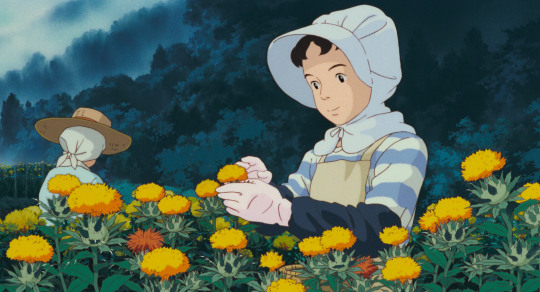
Taeko picks safflower as the Bulgarian song “Malka moma dvori mete” plays in the background. © Studio Ghibli
In a 2021 interview with students from Sofia University St. Kliment Ohridski, producer Suzuki recounts how a record of Bulgarian songs performed by the children choir “Bodra Smyana”, introduced to him by director Takahata, inspired the creation of the movie. Moved by the cosmic voices of the children, they decided to make “Only Yesterday” a musical. He also recalls what a tiring process it was to acquire the rights to the music, but if you’ve seen the movie, I am sure you will agree that it was worth it; the haunting, beautiful songs with the pastoral images of farmers picking flowers contribute to one of the greatest scenes created in cinema.
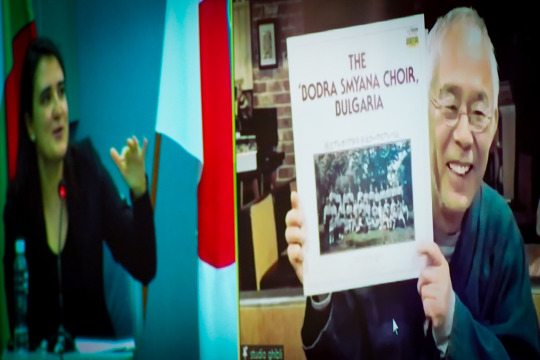
Producer Suzuki showing the record that inspired the creation of ”Only Yesterday”. Source: Studio Ghibli’s Twitter
In “Only Yesterday”, we can hear two songs from the album Bulgarian Polyphony I by Philip Koutev Ensemble. The upbeat “Dilmano Dilbero” [Eng. beautiful Dilmana] sets a happy mood as the protagonist gets changed and ready to go on the field. As the scene shifts and Taeko starts narrating a sad story about the girls in the past picking safflower with their bare hands, the song and mood shift as well.
While the first song has a fast rhythm, with lyrics about pepper planting that can also be interpreted figuratively, the second one, “Malka Moma Dvori Mete” [Eng., a little girl sweeps the yard], is a ballad about a young girl who is forced into marriage but has never known true love.
Both compositions sing about life-cycle events like marriage and the regular coming of the harvests, with lyrics perfectly fitting the setting and plot of the movie, which makes me wonder if the filmmakers chose them by chance or if they had someone translate the words.
Bulgarian Cosmic Voices Enchanting Howl
“Howl’s Moving Castle” is a 2004 Japanese animated fantasy film written and directed by Hayao Miyazaki, loosely based on the 1986 novel of the same name by British author Diana Wynne Jones. Set in a fictional kingdom the movie draws inspiration from various places in Europe. One of them being Bulgaria.
The story focuses on a young girl, named Sophie, magically transformed into an old woman, and a self-confident but emotionally unstable young wizard, Howl, living in a magical moving castle.
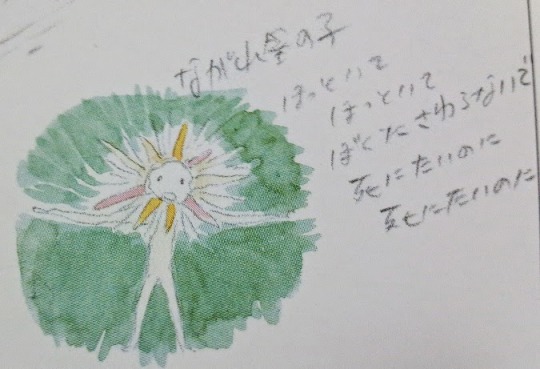
A sketch of a Star Child. Source: The Art of Howl’s Moving Castle
If you’ve seen the movie, you surely remember the scene when Madame Suliman ambushes Howl and tries to strip him of his magic powers. Star Children encircle him and his companions; their shadows grow big, dark and intimidating. They start dancing and chanting unintelligible magic words and are almost successful in their devilish act.
This scene, together with the music played in the background, have been a favourite of many fans of the film. Some even recount it giving them nightmares when they were children.
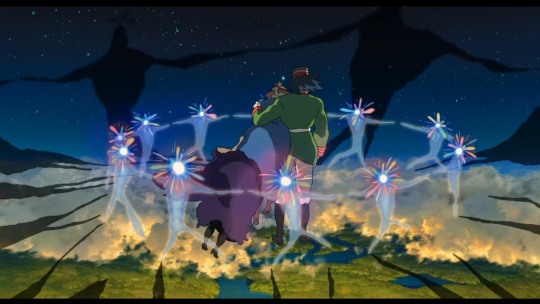
Star Children encircle Howl in an attempt to strip him of his magic powers. © Studio Ghibli
It turns out, however, that these aren’t any incantations, but the lyrics of a folk song. In Bulgarian. And a love song! Contrary to popular belief, the lyrics have nothing to do with magic and are actually about a boy taking his sweetheart, Dona, to the market to buy her new clothes. The excerpt used in the movie is very short and a bit altered from the original, but the words used go like this: Trendafilcheto, kalafercheto, Done mamino, translated as “the rose, the costmary, my darling Dona”.
I am planing a follow up article where I will post the translated lyrics together with a brief explanation on how they are related to the movies.
If you want to comment on or add something, I would love to hear!
Source
#studio ghibli#only yesterday#howls moving castle#Le Mystère des Voix Bulgares#bulgarian folklore#bulgaria#toshio suzuki#hayao miyazaki#isao takahata#bulgarian music in ghibli films#the boy and the heron#スタジオジブリ#ブルガリア#おもひでぽろぽろ#ハウルの動く城#宮崎駿#高畑勲#鈴木敏夫#bulgarian music
697 notes
·
View notes
Text
The Oral History of Take This To Your Grave – transcription under the cut
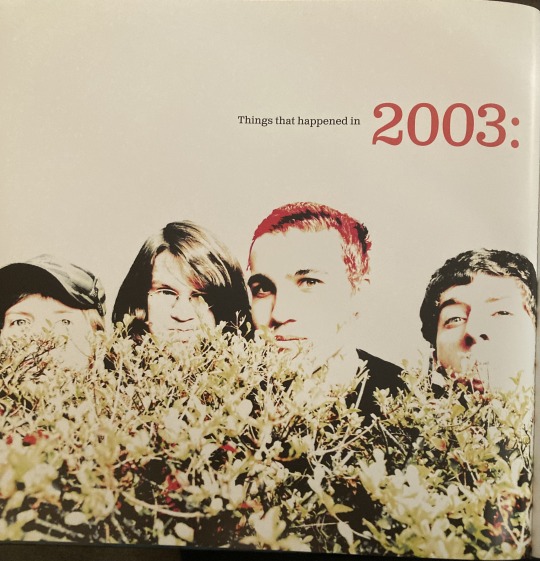
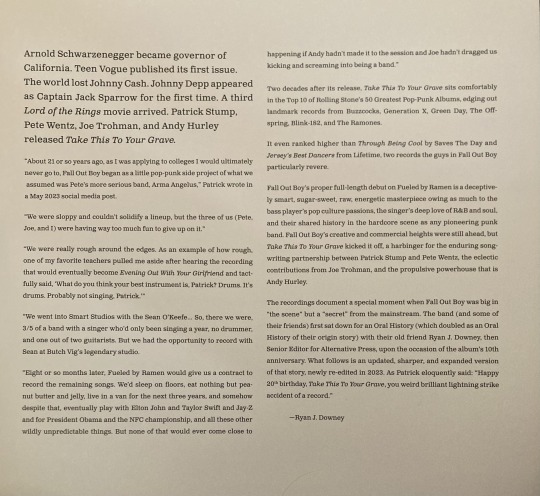
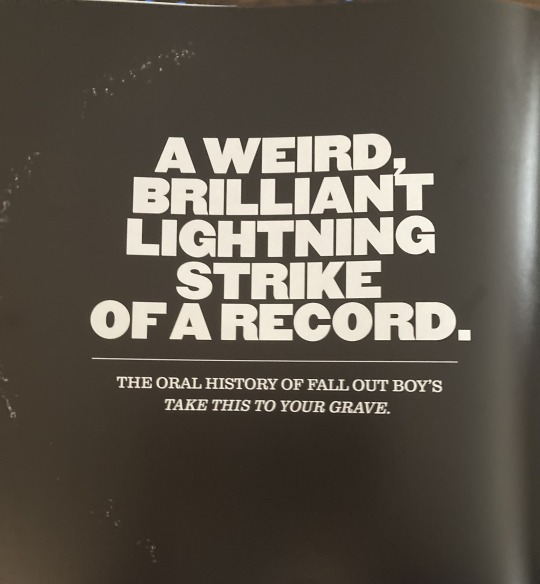
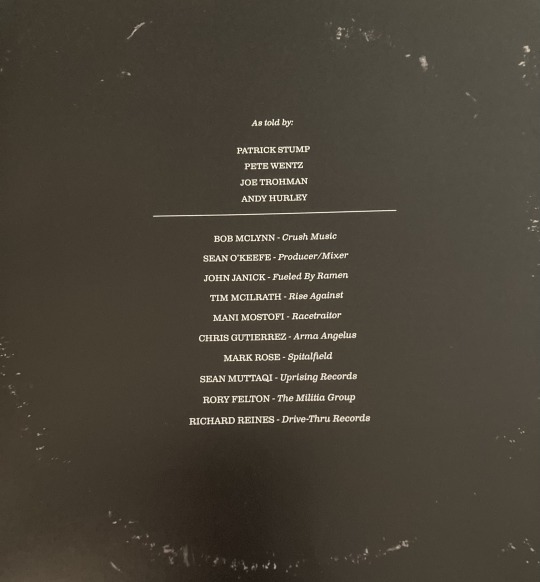
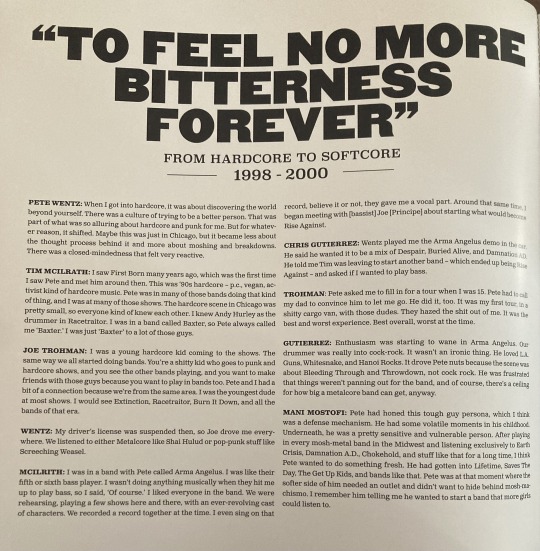
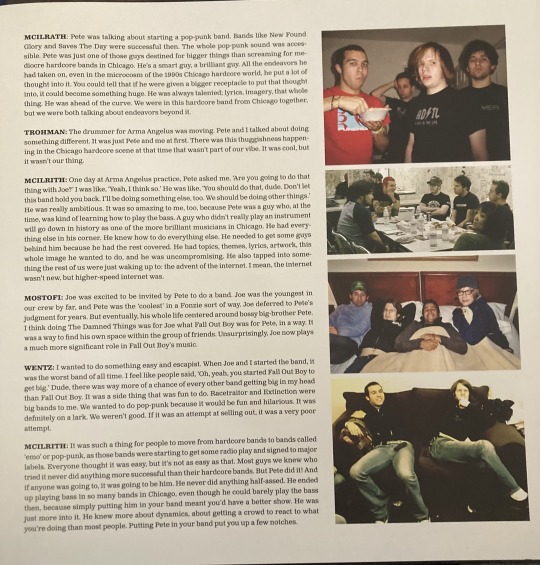

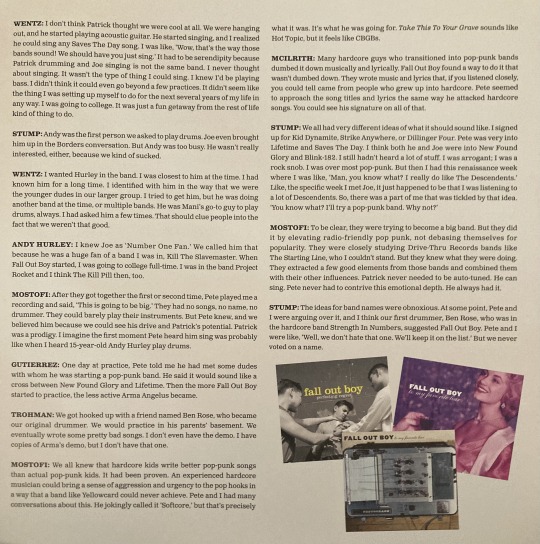
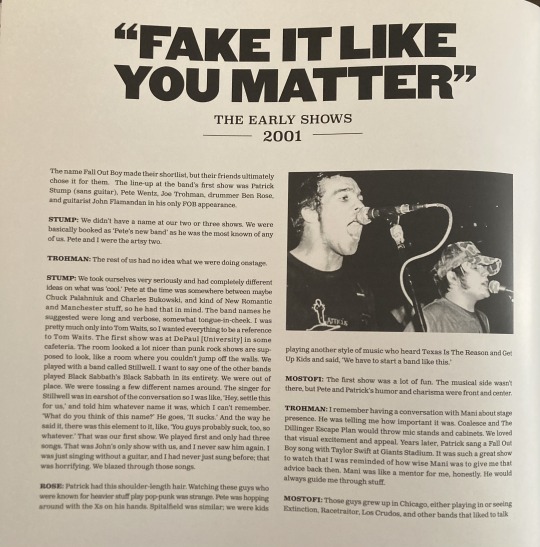
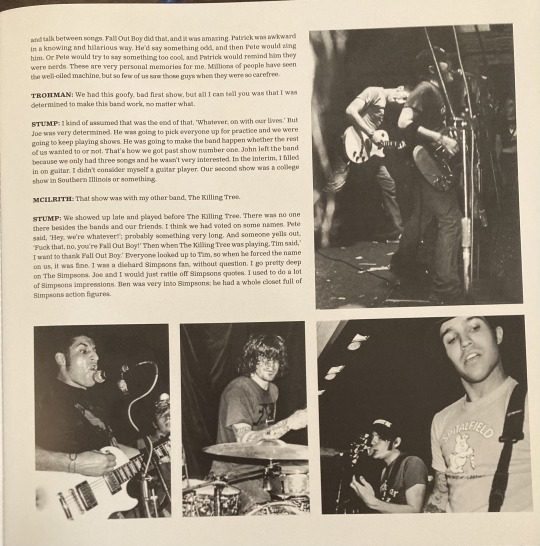
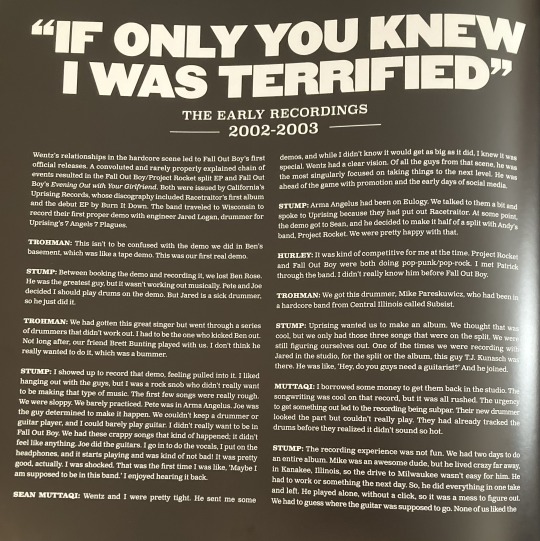
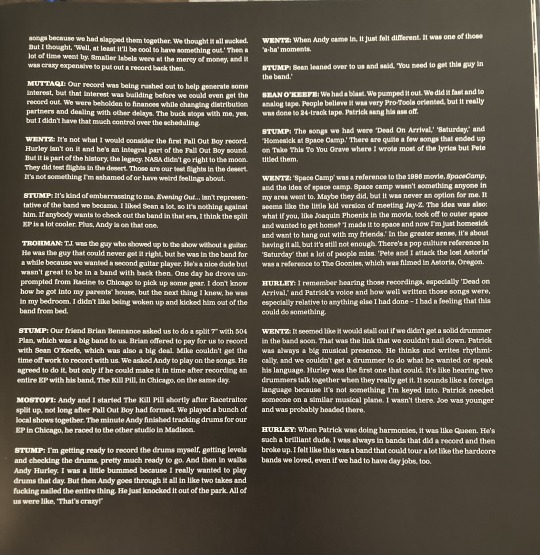
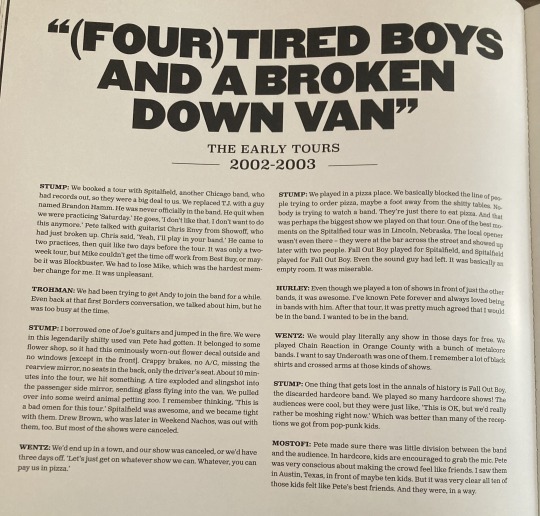
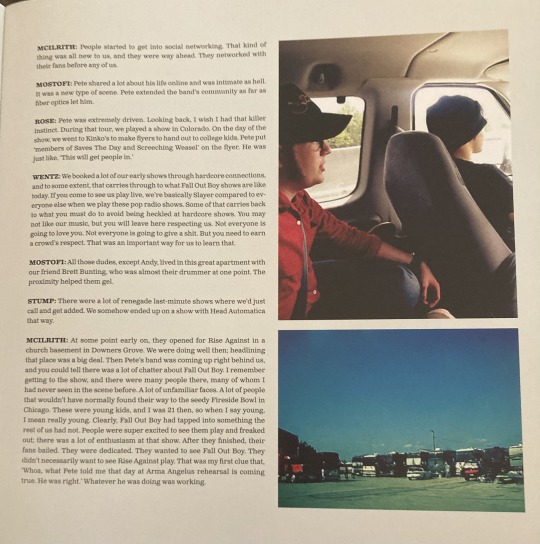
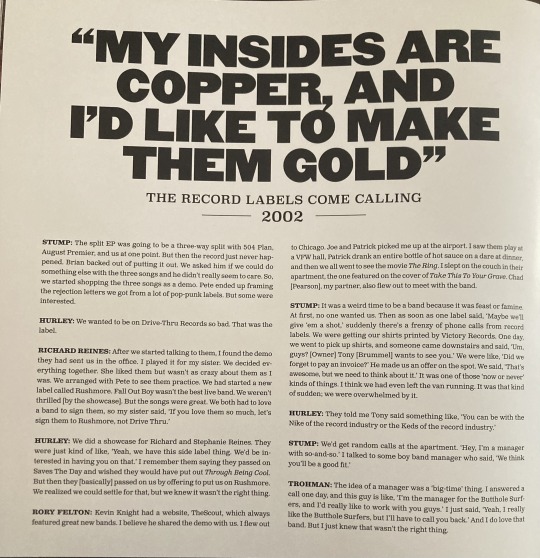
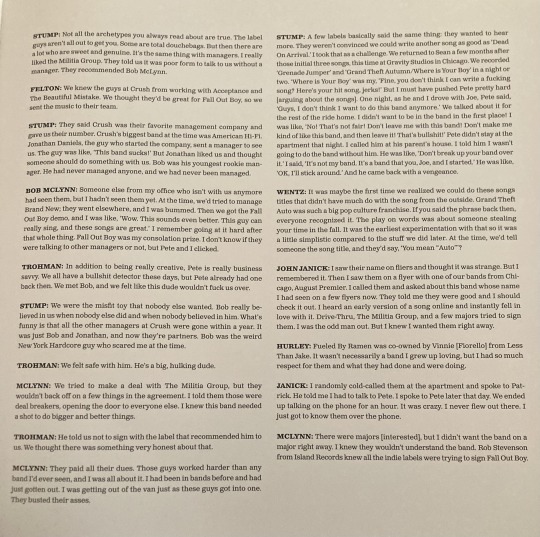
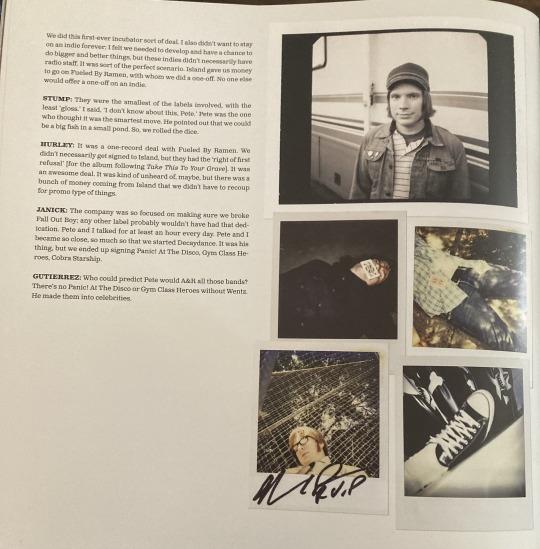
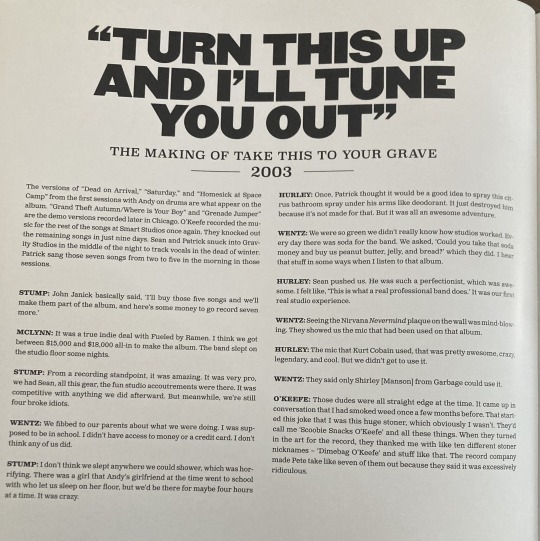
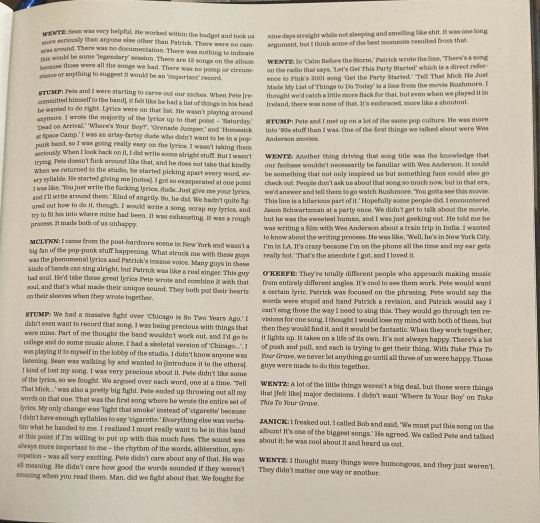
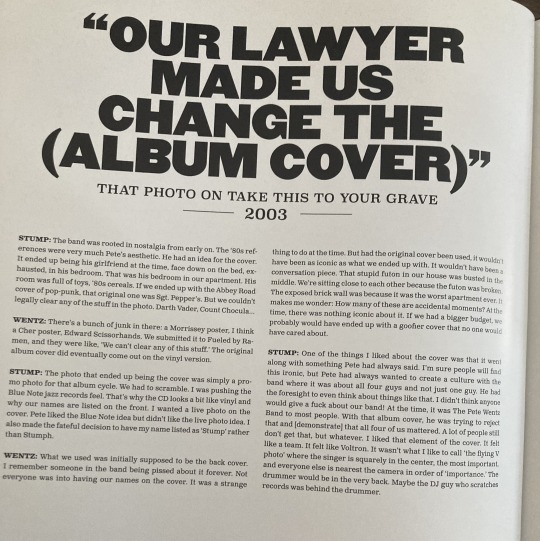
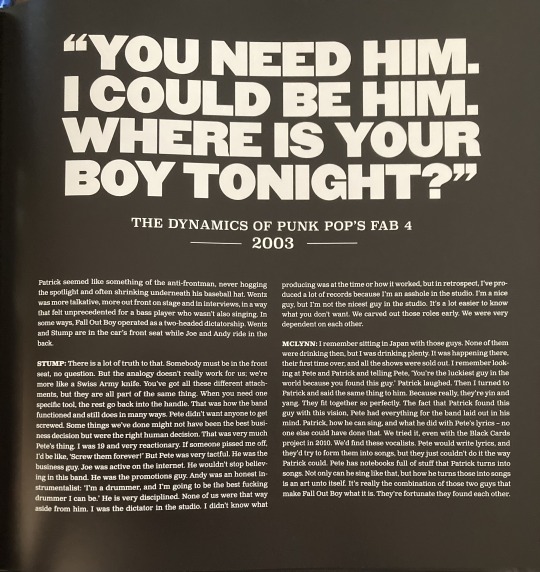
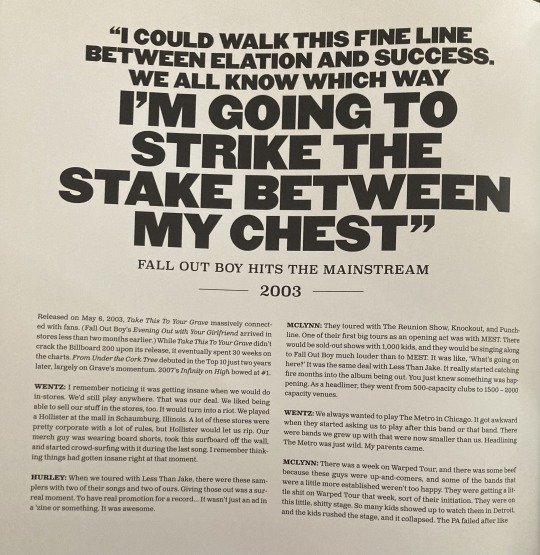
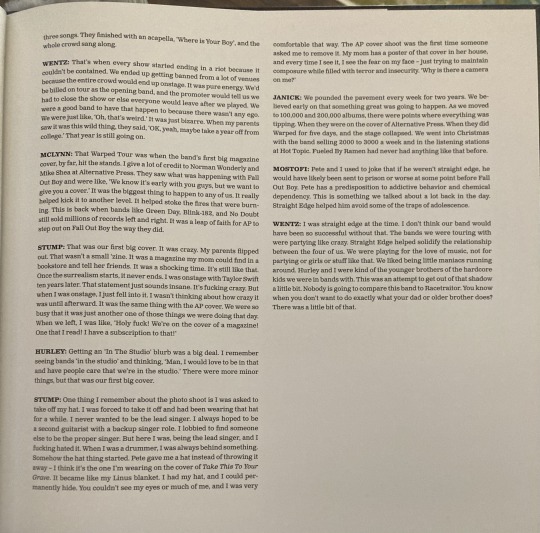
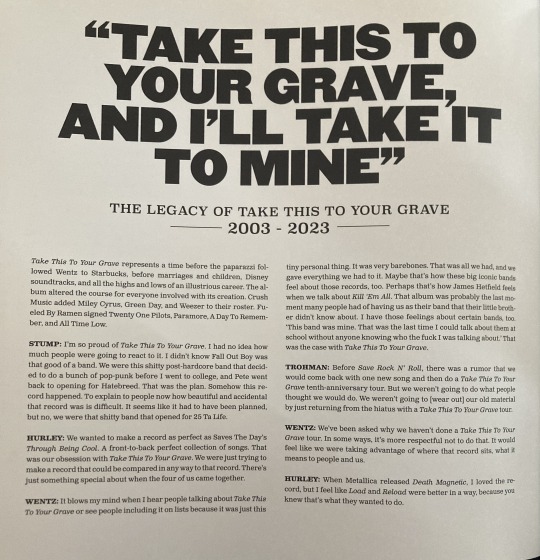
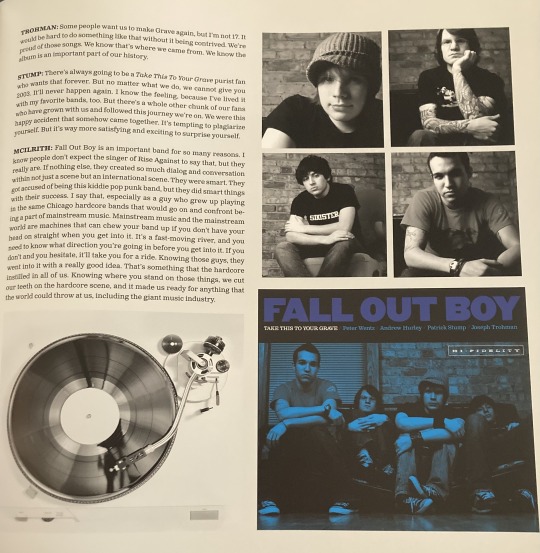
The pages that are just photographs, I haven't included. This post is already long enough.
Things that happened in 2003: Arnold Schwarzenegger became governor of California. Teen Vogue published its first issue. The world lost Johnny Cash. Johnny Depp appeared as Captain Jack Sparrow for the first time. A third Lord of the Rings movie arrived. Patrick Stump, Pete Wentz, Joe Trohman, and Andy Hurley released Take This To Your Grave.
"About 21 years ago or so, as I was applying to colleges I would ultimately never go to, Fall Out Boy began as a little pop-punk side project of what we assumed was Pete's more serious band, Arma Angelus," Patrick wrote in a May 2023 social media post.
"We were sloppy and couldn't solidify a lineup, but the three of us (Pete, Joe, and I) were having way too much fun to give up on it."
"We were really rough around the edges. As an example of how rough, one of my favorite teachers pulled me aside after hearing the recording that would eventually become Evening Out With Your Girlfriend and tactfully said, 'What do you think your best instrument is, Patrick? Drums. It's drums. Probably not singing, Patrick.'"
"We went into Smart Studios with the Sean O'Keefe... So, there we were, 3/5 of a band with a singer who'd only been singing a year, no drummer, and one out of two guitarists. But we had the opportunity to record with Sean at Butch Vig's legendary studio.
"Eight or so months later, Fueled by Ramen would give us a contract to record the remaining songs. We'd sleep on floors, eat nothing but peanut butter and jelly, live in a van for the next three years, and somehow despite that, eventually play with Elton John and Taylor Swift and Jay-Z and for President Obama and the NFC championship, and all these other wildly unpredictable things. But none of that would ever come close to happening if Andy hadn't made it to the session and Joe hadn't dragged us kicking and screaming into being a band."
Two decades after its release, Take This To Your Grave sits comfortable in the Top 10 of Rolling Stone's 50 Greatest Pop-Punk Albums, edging out landmark records from Buzzcocks, Generation X, Green Day, The Offspring, Blink-182, and The Ramones.
It even ranked higher than Through Being Cool by Saves The Day and Jersey's Best Dancers from Lifetime, two records the guys in Fall Out Boy particularly revere.
Fall Out Boy's proper full-length debut on Fueled by Ramen is a deceptively smart, sugar-sweet, raw, energetic masterpiece owing as much to the bass player's pop culture passions, the singers deep love of R&B and soul, and their shared history in the hardcore scene as any pioneering punk band. Fall Out Boy's creative and commercial heights were still ahead, but Take This To Your Grave kicked it off, a harbinger for the enduring songwriting partnership between Patrick Stump and Pete Wentz, the eclectic contributions from Joe Trohman, and the propulsive powerhouse that is Andy Hurley.
The recordings document a special moment when Fall Out Boy was big in "the scene" but a "secret" from the mainstream. The band (and some of their friends) first sat down for an Oral History (which doubled as an Oral History of their origin story) with their old friend Ryan J. Downey, then Senior Editor for Alternative Press, upon the occasion of the album's 10th anniversary. What follows is an updated, sharper, and expanded version of that story, newly re-edited in 2023. As Patrick eloquently said: "Happy 20th birthday, Take This To Your Grave, you weird brilliant lightning strike accident of a record."
– Ryan J. Downey.
A Weird, Brilliant Lightning Strike Of A Record. The Oral History Of Fall Out Boy's Take This To Your Grave.
As told by:
Patrick Stump
Pete Wentz
Joe Trohman
Andy Hurley
Bob McLynn - Crush Music
Sean O'Keefe - Producer/Mixer
John Janick - Fueled By Ramen
Tim McIlrath - Rise Against
Mani Mostofi - Racetraitor
Chris Gutierrez - Arma Angelus
Mark Rose - Spitalfield
Sean Muttaqi - Uprising Records
Rory Felton - The Militia Group
Richard Reines - Drive-Thru Records
"To Feel No More Bitterness Forever" - From Hardcore to Softcore, 1998-2000
PETE WENTZ: When I got into hardcore, it was about discovering the world beyond yourself. There was a culture of trying to be a better person. That was part of what was so alluring about hardcore and punk for me. But for whatever reason, it shifted. Maybe this was just in Chicago, but it became less about the thought process behind it and more about moshing and breakdowns. There was a close-mindedness that felt very reactive.
TIM MCILRITH: I saw First Born many years ago, which was the first time I saw Pete and met him around then. This was '90s hardcore - p.c., vegan, activist kind of hardcore music. Pete was in many of those bands doing that kind of thing, and I was at many of those shows. The hardcore scene in Chicago was pretty small, so everyone kind of knew each other. I knew Andy Hurley as the drummer in Racetraitor. I was in a band called Baxter, so Pete always called me 'Baxter.' I was just 'Baxter' to a lot of those guys.
JOE TROHMAN: I was a young hardcore kid coming to the shows. The same way we all started doing bands. You're a shitty kid who goes to punk and hardcore shows, and you see the other bands playing, and you want to make friends with those guys because you want to play in bands too. Pete and I had a bit of a connection because we're from the same area. I was the youngest dude at most shows. I would see Extinction, Racetraitor, Burn It Down, and all the bands of that era.
WENTZ: My driver's license was suspended then, so Joe drove me everywhere. We listened to either Metalcore like Shai Hulud or pop-punk stuff like Screeching Weasel.
MCILRITH: I was in a band with Pete called Arma Angelus. I was like their fifth or sixth bass player. I wasn't doing anything musically when they hit me up to play bass, so I said, 'Of course.' I liked everyone in the band. We were rehearsing, playing a few shows here and there, with an ever-revolving cast of characters. We recorded a record together at the time. I even sing on that record, believe it or not, they gave me a vocal part. Around that same time, I began meeting with [bassist] Joe [Principe] about starting what would become Rise Against.
CHRIS GUTIERREZ: Wentz played me the Arma Angelus demo in the car. He said he wanted it to be a mix of Despair, Buried Alive, and Damnation A.D. He told me Tim was leaving to start another band - which ended up being Rise Against - and asked if I wanted to play bass.
TROHMAN: Pete asked me to fill in for a tour when I was 15. Pete had to call my dad to convince him to let me go. He did it, too. It was my first tour, in a shitty cargo van, with those dudes. They hazed the shit out of me. It was the best and worst experience. Best overall, worst at the time.
GUTIERREZ: Enthusiasm was starting to wane in Arma Angelus. Our drummer was really into cock-rock. It wasn't an ironic thing. He loved L.A. Guns, Whitesnake, and Hanoi Rocks. It drove Pete nuts because the scene was about Bleeding Through and Throwdown, not cock rock. He was frustrated that things weren't panning out for the band, and of course, there's a ceiling for how big a metalcore band can get, anyway.
MANI MOSTOFI: Pete had honed this tough guy persona, which I think was a defense mechanism. He had some volatile moments in his childhood. Underneath, he was a pretty sensitive and vulnerable person. After playing in every mosh-metal band in the Midwest and listening exclusively to Earth Crisis, Damnation A.D., Chokehold, and stuff like that for a long time, I think Pete wanted to do something fresh. He had gotten into Lifetime, Saves The Day, The Get Up Kids, and bands like that. Pete was at that moment where the softer side of him needed an outlet, and didn't want to hide behind mosh-machismo. I remember him telling me he wanted to start a band that more girls could listen to.
MCILRATH: Pete was talking about starting a pop-punk band. Bands like New Found Glory and Saves The Day were successful then. The whole pop-punk sound was accessible. Pete was just one of those guys destined for bigger things than screaming for mediocre hardcore bands in Chicago. He's a smart guy, a brilliant guy. All the endeavors he had taken on, even in the microcosm of the 1990s Chicago hardcore world, he put a lot of though into it. You could tell that if he were given a bigger receptacle to put that thought into, it could become something huge. He was always talented: lyrics, imagery, that whole thing. He was ahead of the curve. We were in this hardcore band from Chicago together, but we were both talking about endeavors beyond it.
TROHMAN: The drummer for Arma Angelus was moving. Pete and I talked about doing something different. It was just Pete and me at first. There was this thuggishness happening in the Chicago hardcore scene at that time that wasn't part of our vibe. It was cool, but it wasn't our thing.
MCILRITH: One day at Arma Angelus practice, Pete asked me, 'Are you going to do that thing with Joe?' I was like, 'Yeah, I think so.' He was like, 'You should do that, dude. Don't let this band hold you back. I'll be doing something else, too. We should be doing other things.' He was really ambitious. It was so amazing to me, too, because Pete was a guy who, at the time, was kind of learning how to play the bass. A guy who didn't really play an instrument will do down in history as one of the more brilliant musicians in Chicago. He had everything else in his corner. He knew how to do everything else. He needed to get some guys behind him because he had the rest covered. He had topics, themes, lyrics, artwork, this whole image he wanted to do, and he was uncompromising. He also tapped into something the rest of us were just waking up to: the advent of the internet. I mean, the internet wasn't new, but higher-speed internet was.
MOSTOFI: Joe was excited to be invited by Pete to do a band. Joe was the youngest in our crew by far, and Pete was the 'coolest' in a Fonzie sort of way. Joe deferred to Pete's judgement for years. But eventually, his whole life centered around bossy big-brother Pete. I think doing The Damned Things was for Joe what Fall Out Boy was for Pete, in a way. It was a way to find his own space within the group of friends. Unsurprisingly, Joe now plays a much more significant role in Fall Out Boy's music.
WENTZ: I wanted to do something easy and escapist. When Joe and I started the band, it was the worst band of all time. I feel like people said, 'Oh, yeah, you started Fall Out Boy to get big.' Dude, there was way more of a chance of every other band getting big in my head than Fall Out Boy. It was a side thing that was fun to do. Racetraitor and Extinction were big bands to me. We wanted to do pop-punk because it would be fun and hilarious. It was definitely on a lark. We weren't good. If it was an attempt at selling out, it was a very poor attempt.
MCILRITH: It was such a thing for people to move from hardcore bands to bands called 'emo' or pop-punk, as those bands were starting to get some radio play and signed to major labels. Everyone thought it was easy, but it's not as easy as that. Most guys we knew who tried it never did anything more successful than their hardcore bands. But Pete did it! And if anyone was going to, it was going to be him. He never did anything half-assed. He ended up playing bass in so many bands in Chicago, even though he could barely play the bass then, because simply putting him in your band meant you'd have a better show. He was just more into it. He knew more about dynamics, about getting a crowd to react to what you're doing than most people. Putting Pete in your band put you up a few notches.
"I'm Writing You A Chorus And Here Is Your Verse" - When Pete met Patrick, early 2001.
MARK ROSE: Patrick Stump played drums in this grindcore band called Grinding Process. They had put out a live split cassette tape.
PATRICK STUMP: My ambition always outweighed my ability or actual place in the world. I was a drummer and played in many bands and tried to finagle my way into better ones but never really managed. I was usually outgunned by the same two guys: this guy Rocky Senesce; I'm not sure if he's playing anymore, but he was amazing. And this other guy, De'Mar Hamilton, who is now in Plain White T's. We'd always go out for the same bands. I felt like I was pretty good, but then those guys just mopped the floor with me. I hadn't been playing music for a few months. I think my girlfriend dumped me. I was feeling down. I wasn't really into pop-punk or emo. I think at the time I was into Rhino Records box sets.
TROHMAN: I was at the Borders in Eden's Plaza in Wilmette, Illinois. My friend Arthur was asking me about Neurosis. Patrick just walked up and started talking to me.
STUMP: I was a bit arrogant and cocky, like a lot of young musicians. Joe was talking kind of loudly and I overheard him say something about Neurosis, and I think I came in kind of snotty, kind of correcting whatever they had said.
TROHMAN: We just started talking about music, and my buddy Arthur got shoved out of the conversation. I told him about the band we were starting. Pete was this local hardcore celebrity, which intrigued Patrick.
STUMP: I had similar conversations with any number of kids my age. This conversation didn't feel crazy special. That's one of the things that's real about [Joe and I meeting], and that's honest about it, that's it's not some 'love at first sight' thing where we started talking about music and 'Holy smokes, we're going to have the best band ever!' I had been in a lot of bands up until then. Hardcore was a couple of years away from me at that point. I was over it, but Pete was in real bands; that was interesting. Now I'm curious and I want to do this thing, or at least see what happens. Joe said they needed a drummer, guitar player, or singer, and I kind of bluffed and said I could do any one of those things for a pop-punk band. I'd had a lot of conversations about starting bands where I meet up with somebody and maybe try to figure out some songs and then we'd never see each other again. There were a lot of false starts and I assumed this would be just another one of those, but it would be fun for this one to be with the guy from Racetraitor and Extinction.
TROHMAN: He gave me the link to his MP3.com page. There were a few songs of him just playing acoustic and singing. He was awesome.
WENTZ: Joe told me we were going to this kid's house who would probably be our drummer but could also sing. He sent me a link to Patrick singing some acoustic thing, but the quality was so horrible it was hard to tell what it was. Patrick answered the door in some wild outfit. He looked like an emo kid but from the Endpoint era - dorky and cool. We went into the basement, and he was like, trying to set up his drums.
TROHMAN: Patrick has said many times that he intended to try out on drums. I was pushing for him to sing after hearing his demos. 'Hey! Sing for us!' I asked him to take out his acoustic guitar. He played songs from Saves The Day's Through Being Cool. I think he sang most of the record to us. We were thrilled. We had never been around someone who could sing like that.
WENTZ: I don't think Patrick thought we were cool at all. We were hanging out, and he started playing acoustic guitar. He started singing, and I realized he could sing any Saves The Day song. I was like, 'Wow, that's the way those bands sound! We should just have you sing.' It had to be serendipity because Patrick drumming and Joe singing is not the same band. I never thought about singing. It wasn't the type of thing I could sing. I knew I'd be playing bass. I didn't think it'd even go beyond a few practices. It didn't seem like the thing I was setting myself up to do for the next several years of my life in any way. I was going to college. It was just a fun getaway from the rest of life kind of thing to do.
STUMP: Andy was the first person we asked to play drums. Joe even brought him up in the Borders conversation. But Andy was too busy. He wasn't really interested, either, because we kind of sucked.
WENTZ: I wanted Hurley in the band, I was closest to him at the time, I had known him for a long time. I identified with him in the way that we were the younger dudes in our larger group. I tried to get him, but he was doing another band at the time, or multiple bands. He was Mani's go-to guy to play drums, always. I had asked him a few times. That should clue people into the fact that we weren't that good.
ANDY HURLEY: I knew Joe as 'Number One Fan.' We called him that because he was a huge fan of a band I was in, Kill The Slavemaster. When Fall Out Boy started, I was going to college full-time. I was in the band Project Rocket and I think The Kill Pill then, too.
MOSTOFI: After they got together the first or second time, Pete played me a recording and said, 'This is going to be big.' They had no songs, no name, no drummer. They could barely play their instruments. But Pete knew, and we believed him because we could see his drive and Patrick's potential. Patrick was prodigy. I imagine the first moment Pete heard him sing was probably like when I heard 15-year-old Andy Hurley play drums.
GUTIERREZ: One day at practice, Pete told me he had met some dudes with whom he was starting a pop-punk band. He said it would sound like a cross between New Found Glory and Lifetime. Then the more Fall Out Boy started to practice, the less active Arma Angelus became.
TROHMAN: We got hooked up with a friend named Ben Rose, who became our original drummer. We would practice in his parents' basement. We eventually wrote some pretty bad songs. I don't even have the demo. I have copies of Arma's demo, but I don't have that one.
MOSTOFI: We all knew that hardcore kids write better pop-punk songs than actual pop-punk kids. It had been proven. An experienced hardcore musician could bring a sense of aggression and urgency to the pop hooks in a way that a band like Yellowcard could never achieve. Pete and I had many conversations about this. He jokingly called it 'Softcore,' but that's precisely what it was. It's what he was going for. Take This To Your Grave sounds like Hot Topic, but it feels like CBGBs.
MCILRITH: Many hardcore guys who transitioned into pop-punk bands dumbed it down musically and lyrically. Fall Out Boy found a way to do it that wasn't dumbed down. They wrote music and lyrics that, if you listened closely, you could tell came from people who grew up into hardcore. Pete seemed to approach the song titles and lyrics the same way he attacked hardcore songs. You could see his signature on all of that.
STUMP: We all had very different ideas of what it should sound like. I signed up for Kid Dynamite, Strike Anywhere, or Dillinger Four. Pete was very into Lifetime and Saves The Day. I think both he and Joe were into New Found Glory and Blink-182. I still hadn't heard a lot of stuff. I was arrogant; I was a rock snob. I was over most pop-punk. But then I had this renaissance week where I was like, 'Man, you know what? I really do like The Descendents.' Like, the specific week I met Joe, it just happened to be that I was listening to a lot of Descendents. So, there was a part of me that was tickled by that idea. 'You know what? I'll try a pop-punk band. Why not?'
MOSTOFI: To be clear, they were trying to become a big band. But they did it by elevating radio-friendly pop punk, not debasing themselves for popularity. They were closely studying Drive-Thru Records bands like The Starting Line, who I couldn't stand. But they knew what they were doing. They extracted a few good elements from those bands and combined them with their other influences. Patrick never needed to be auto-tuned. He can sing. Pete never had to contrive this emotional depth. He always had it.
STUMP: The ideas for band names were obnoxious. At some point, Pete and I were arguing over it, and I think our first drummer, Ben Rose, who was in the hardcore band Strength In Numbers, suggested Fall Out Boy. Pete and I were like, 'Well, we don't hate that one. We'll keep it on the list.' But we never voted on a name.
"Fake It Like You Matter" - The Early Shows, 2001
The name Fall Out Boy made their shortlist, but their friends ultimately chose it for them. The line-up at the band's first show was Patrick Stump (sans guitar), Pete Wentz, Joe Trohman, drummer Ben Rose, and guitarist John Flamandan in his only FOB appearance.
STUMP: We didn't have a name at our two or three shows. We were basically booked as 'Pete's new band' as he was the most known of any of us. Pete and I were the artsy two.
TROHMAN: The rest of us had no idea what we were doing onstage.
STUMP: We took ourselves very seriously and completely different ideas on what was 'cool.' Pete at the time was somewhere between maybe Chuck Palahniuk and Charles Bukowski, and kind of New Romantic and Manchester stuff, so he had that in mind. The band names he suggested were long and verbose, somewhat tongue-in-cheek. I was pretty much only into Tom Waits, so I wanted everything to be a reference to Tom Waits. The first show was at DePaul [University] in some cafeteria. The room looked a lot nicer than punk rock shows are supposed to look, like a room where you couldn't jump off the walls. We played with a band called Stillwell. I want to say one of the other bands played Black Sabbath's Black Sabbath in its entirety. We were out of place. We were tossing a few different names around. The singer for Stillwell was in earshot of the conversation so I was like 'Hey, settle this for us,' and told him whatever name it was, which I can't remember. 'What do you think of this name?' He goes, 'It sucks.' And the way he said it, there was this element to it, like, 'You guys probably suck, too, so whatever.' That was our first show. We played first and only had three songs. That was John's only show with us, and I never saw him again. I was just singing without a guitar, and I had never just sung before; that was horrifying. We blazed through those songs.
ROSE: Patrick had this shoulder-length hair. Watching these guys who were known for heavier stuff play pop-punk was strange. Pete was hopping around with the X's on his hands. Spitalfield was similar; we were kids playing another style of music who heard Texas Is The Reason and Get Up Kids and said, 'We have to start a band like this.'
MOSTOFI: The first show was a lot of fun. The musical side wasn't there, but Pete and Patrick's humor and charisma were front and center.
TROHMAN: I remember having a conversation with Mani about stage presence. He was telling me how important it was. Coalesce and The Dillinger Escape Plan would throw mic stands and cabinets. We loved that visual excitement and appeal. Years later, Patrick sang a Fall Out Boy song with Taylor Swift at Giants Stadium. It was such a great show to watch that I was reminded of how wise Mani was to give me that advice back then. Mani was like a mentor for me, honestly. He would always guide me through stuff.
MOSTOFI: Those guys grew up in Chicago, either playing in or seeing Extinction, Racetraitor, Los Crudos, and other bands that liked to talk and talk between songs. Fall Out Boy did that, and it was amazing. Patrick was awkward in a knowing and hilarious way. He'd say something odd, and then Pete would zing him. Or Pete would try to say something too cool, and Patrick would remind him they were nerds. These are very personal memories for me. Millions of people have seen the well-oiled machine, but so few of us saw those guys when they were so carefree.
TROHMAN: We had this goofy, bad first show, but all I can tell you was that I was determined to make this band work, no matter what.
STUMP: I kind of assumed that was the end of that. 'Whatever, on with our lives.' But Joe was very determined. He was going to pick us up for practice and we were going to keep playing shows. He was going to make the band happen whether the rest of us wanted to or not. That's how we got past show number one. John left the band because we only had three songs and he wasn't very interested. In the interim, I filled in on guitar. I didn't consider myself a guitar player. Our second show was a college show in Southern Illinois or something.
MCILRITH: That show was with my other band, The Killing Tree.
STUMP: We showed up late and played before The Killing Tree. There was no one there besides the bands and our friends. I think we had voted on some names. Pete said 'Hey, we're whatever!'; probably something very long. And someone yells out, 'Fuck that, no, you're Fall Out Boy!' Then when The Killing Tree was playing, Tim said, 'I want to thank Fall Out Boy.' Everyone looked up to Tim, so when he forced the name on us, it was fine. I was a diehard Simpsons fan, without question. I go pretty deep on The Simpsons. Joe and I would just rattle off Simpsons quotes. I used to do a lot of Simpsons impressions. Ben was very into Simpsons; he had a whole closet full of Simpsons action figures.
"If Only You Knew I Was Terrified" - The Early Recordings, 2002-2003
Wentz's relationships in the hardcore scene led to Fall Out Boy's first official releases. A convoluted and rarely properly explained chain of events resulted in the Fall Out Boy/Project Rocket split EP and Fall Out Boy's Evening Out with Your Girlfriend. Both were issued by California's Uprising Records, whose discography included Racetraitor's first album and the debut EP by Burn It Down. The band traveled to Wisconsin to record their first proper demo with engineer Jared Logan, drummer for Uprising's 7 Angels 7 Plagues.
TROHMAN: This isn't to be confused with the demo we did in Ben's basement, which was like a tape demo. This was our first real demo.
STUMP: Between booking the demo and recording it, we lost Ben Rose. He was the greatest guy, but it wasn't working out musically. Pete and Joe decided I should play drums on the demo. But Jared is a sick drummer, so he just did it.
TROHMAN: We had gotten this great singer but went through a series of drummers that didn't work out. I had to be the one who kicked Ben out. Not long after, our friend Brett Bunting played with us. I don't think he really wanted to do it, which was a bummer.
STUMP: I showed up to record that demo, feeling pulled into it. I liked hanging out with the guys, but I was a rock snob who didn't really want to be making that type of music. The first few songs were really rough. We were sloppy. We barely practiced. Pete was in Arma Angelus. Joe was the guy determined to make it happen. We couldn't keep a drummer or guitar player, and I could barely play guitar. I didn't really want to be in Fall Out Boy. We had these crappy songs that kind of happened; it didn't feel like anything. Joe did the guitars. I go in to do the vocals, I put on the headphones, and it starts playing and was kind of not bad! It was pretty good, actually. I was shocked. That was the first time I was like, 'Maybe I am supposed to be in this band.' I enjoyed hearing it back.
SEAN MUTTAQI: Wentz and I were pretty tight. He sent me some demos, and while I didn't know it would get as big as it did, I knew it was special. Wentz had a clear vision. Of all the guys from that scene, he was the most singularly focused on taking things to the next level. He was ahead of the game with promotion and the early days of social media.
STUMP: Arma Angelus had been on Eulogy. We talked to them a bit and spoke to Uprising because they had put out Racetraitor. At some point, the demo got to Sean, and he decided to make it half of a split with Andy's band, Project Rocket. We were pretty happy with that.
HURLEY: It was kind of competitive for me at the time. Project Rocket and Fall Out Boy were both doing pop-punk/pop-rock, I met Patrick through the band. I didn't really know him before Fall Out Boy.
TROHMAN: We got this drummer, Mike Pareskuwicz, who had been in a hardcore band from Central Illinois called Subsist.
STUMP: Uprising wanted us to make an album. We thought that was cool, but we only had those three songs that were on the split. We were still figuring ourselves out. One of the times we were recording with Jared in the studio, for the split or the album, this guy T.J. Kunasch was there. He was like, 'Hey, do you guys need a guitarist?' And he joined.
MUTTAQI: I borrowed some money to get them back in the studio. The songwriting was cool on that record, but it was all rushed. The urgency to get something out led to the recording being subpar. Their new drummer looked the part but couldn't really play. They had already tracked the drums before they realized it didn't sound so hot.
STUMP: The recording experience was not fun. We had two days to do an entire album. Mike was an awesome dude, but he lived crazy far away, in Kanakee, Illinois, so the drive to Milwaukee wasn't easy for him. He had to work or something the next day. So, he did everything in one take and left. He played alone, without a click, so it was a ness to figure out. We had to guess where the guitar was supposed to go. None of us liked the songs because we had slapped them together. We thought it all sucked. But I thought, 'Well, at least it'll be cool to have something out.' Then a lot of time went by. Smaller labels were at the mercy of money, and it was crazy expensive to put out a record back then.
MUTTAQI: Our record was being rushed out to help generate some interest, but that interest was building before we could even get the record out. We were beholden to finances while changing distribution partners and dealing with other delays. The buck stops with me, yes, but I didn't have that much control over the scheduling.
WENTZ: It's not what I would consider the first Fall Out Boy record. Hurley isn't on it and he's an integral part of the Fall Out Boy sound. But it is part of the history, the legacy. NASA didn't go right to the moon. They did test flights in the desert. Those are our test flights in the desert. It's not something I'm ashamed of or have weird feelings about.
STUMP: It's kind of embarrassing to me. Evening Out... isn't representative of the band we became. I liked Sean a lot, so it's nothing against him. If anybody wants to check out the band in that era, I think the split EP is a lot cooler. Plus, Andy is on that one.
TROHMAN: T.J. was the guy who showed up to the show without a guitar. He was the guy that could never get it right, but he was in the band for a while because we wanted a second guitar player. He's a nice dude but wasn't great to be in a band with back then. One day he drove unprompted from Racine to Chicago to pick up some gear. I don't know how he got into my parents' house, but the next thing I knew, he was in my bedroom. I didn't like being woken up and kicked him out of the band from bed.
STUMP: Our friend Brian Bennance asked us to do a split 7" with 504 Plan, which was a big band to us. Brian offered to pay for us to record with Sean O'Keefe, which was also a big deal. Mike couldn't get the time off work to record with us. We asked Andy to play on the songs. He agreed to do it, but only if he could make it in time after recording an entire EP with his band, The Kill Pill, in Chicago, on the same day.
MOSTOFI: Andy and I started The Kill Pill shortly after Racetraitor split up, not long after Fall Out Boy had formed. We played a bunch of local shows together. The minute Andy finished tracking drums for our EP in Chicago, he raced to the other studio in Madison.
STUMP: I'm getting ready to record the drums myself, getting levels and checking the drums, pretty much ready to go. And then in walks Andy Hurley. I was a little bummed because I really wanted to play drums that day. But then Andy goes through it all in like two takes and fucking nailed the entire thing. He just knocked it out of the park. All of us were like, 'That's crazy!'
WENTZ: When Andy came in, It just felt different. It was one of those 'a-ha' moments.
STUMP: Sean leaned over to us and said, 'You need to get this guy in the band.'
SEAN O'KEEFE: We had a blast. We pumped It out. We did it fast and to analog tape. People believe it was very Pro Tools oriented, but it really was done to 24-track tape. Patrick sang his ass off.
STUMP: The songs we had were 'Dead On Arrival,' 'Saturday,' and 'Homesick at Space Camp. There are quite a few songs that ended up on Take This To You Grave where I wrote most of the lyrics but Pete titled them.
WENTZ: 'Space Camp' was a reference to the 1986 movie, SpaceCamp, and the idea of space camp. Space camp wasn't something anyone in my area went to. Maybe they did, but it was never an option for me. It seems like the little kid version of meeting Jay-Z. The idea was also: what if you, like Joaquin Phoenix in the movie, took off to outer space and wanted to get home? 'I made it to space and now I'm just homesick and want to hang out with my friends.' In the greater sense, it's about having it all, but it's still not enough. There's a pop culture reference in 'Saturday' that a lot of people miss. 'Pete and I attack the lost Astoria' was a reference to The Goonies, which was filmed in Astoria, Oregon.
HURLEY: I remember hearing those recordings, especially 'Dead on Arrival,' and Patrick's voice and how well written those songs were, especially relative to anything else I had done - I had a feeling that this could do something.
WENTZ: It seemed like it would stall out if we didn't get a solid drummer in the band soon. That was the link that we couldn't nail down. Patrick was always a big musical presence. He thinks and writes rhythmi-cally, and we couldn't get a drummer to do what he wanted or speak his language. Hurley was the first one that could. It's like hearing two drummers talk together when they really get it. It sounds like a foreign language because it's not something I'm keyed into. Patrick needed someone on a similar musical plane. I wasn't there. Joe was younger and was probably headed there.
HURLEY: When Patrick was doing harmonies, it was like Queen. He's such a brilliant dude. I was always in bands that did a record and then broke up. I felt like this was a band that could tour a lot like the hardcore bands we loved, even if we had to have day jobs, too.
"(Four) Tired Boys And A Broken Down Van" - The Early Tours, 2002-2003
STUMP: We booked a tour with Spitalfield, another Chicago band, who had records out, so they were a big deal to us. We replaced T.J. with a guy named Brandon Hamm. He was never officially in the band. He quit when we were practicing 'Saturday.' He goes, 'I don't like that. I don't want to do this anymore.' Pete talked with guitarist Chris Envy from Showoff, who had just broken up. Chris said, 'Yeah, I'll play in your band.' He came to two practices, then quit like two days before the tour. It was only a two-week tour, but Mike couldn't get the time off work from Best Buy, or maybe it was Blockbuster. We had to lose Mike, which was the hardest member change for me. It was unpleasant.
TROHMAN: We had been trying to get Andy to join the band for a while. Even back at that first Borders conversation, we talked about him, but he was too busy at the time.
STUMP: I borrowed one of Joe's guitars and jumped in the fire. We were in this legendarily shitty used van Pete had gotten. It belonged to some flower shop, so it had this ominously worn-out flower decal outside and no windows [except in the front]. Crappy brakes, no A/C, missing the rearview mirror, no seats in the back, only the driver's seat. About 10 minutes into the tour, we hit something. A tire exploded and slingshot into the passenger side mirror, sending glass flying into the van. We pulled over into some weird animal petting zoo. I remember thinking, 'This is a bad omen for this tour.' Spitalfield was awesome, and we became tight with them. Drew Brown, who was later in Weekend Nachos, was out with them, too. But most of the shows were canceled.
WENTZ: We'd end up in a town, and our show was canceled, or we'd have three days off. 'Let's just get on whatever show we can. Whatever, you can pay us in pizza.'
STUMP: We played in a pizza place. We basically blocked the line of people trying to order pizza, maybe a foot away from the shitty tables. Nobody is trying to watch a band. They're just there to eat pizza. And that was perhaps the biggest show we played on that tour. One of the best moments on the Spitalfied tour was in Lincoln, Nebraska. The local opener wasn't even there - they were at the bar across the street and showed up later with two people. Fall Out Boy played for Spitalfield, and Spitalfield played for Fall Out Boy. Even the sound guy had left. It was basically an empty room. It was miserable.
HURLEY: Even though we played a ton of shows in front of just the other bands, it was awesome. I've known Pete forever and always loved being in bands with him. After that tour, it was pretty much agreed that I would be in the band. I wanted to be in the band.
WENTZ: We would play literally any show in those days for free. We played Chain Reaction in Orange County with a bunch of metalcore bands. I want to say Underoath was one of them. I remember a lot of black shirts and crossed arms at those kinds of shows. STUMP: One thing that gets lost in the annals of history is Fall Out Boy, the discarded hardcore band. We played so many hardcore shows! The audiences were cool, but they were just like, 'This is OK, but we'd really rather be moshing right now.' Which was better than many of the receptions we got from pop-punk kids.
MOSTOFI: Pete made sure there was little division between the band and the audience. In hardcore, kids are encouraged to grab the mic. Pete was very conscious about making the crowd feel like friends. I saw them in Austin, Texas, in front of maybe ten kids. But it was very clear all ten of those kids felt like Pete's best friends. And they were, in a way.
MCILRITH: People started to get into social networking. That kind of thing was all new to us, and they were way ahead. They networked with their fans before any of us.
MOSTOFI: Pete shared a lot about his life online and was intimate as hell. It was a new type of scene. Pete extended the band's community as far as fiber optics let him.
ROSE: Pete was extremely driven. Looking back, I wish I had that killer instinct. During that tour; we played a show in Colorado. On the day of the show, we went to Kinko's to make flyers to hand out to college kids. Pete put ‘members of Saves The Day and Screeching Weasel’ on the flyer. He was just like, 'This will get people in.'
WENTZ: We booked a lot of our early shows through hardcore connections, and to some extent, that carries through to what Fall Out Boy shows are like today. If you come to see us play live, we're basically Slayer compared to everyone else when we play these pop radio shows. Some of that carries back to what you must do to avoid being heckled at hardcore shows. You may not like our music, but you will leave here respecting us. Not everyone is going to love you. Not everyone is going to give a shit. But you need to earn a crowd's respect. That was an important way for us to learn that.
MOSTOFI: All those dudes, except Andy, lived in this great apartment with our friend Brett Bunting, who was almost their drummer at one point. The proximity helped them gel.
STUMP: There were a lot of renegade last-minute shows where we'd just call and get added. We somehow ended up on a show with Head Automatica that way.
MCILRITH: At some point early on, they opened for Rise Against in a church basement in Downers Grove. We were doing well then; headlining that place was a big deal. Then Pete's band was coming up right behind us, and you could tell there was a lot of chatter about Fall Out Boy. I remember getting to the show, and there were many people there, many of whom I had never seen in the scene before. A lot of unfamiliar faces. A lot of people that wouldn't have normally found their way to the seedy Fireside Bowl in Chicago. These were young kids, and I was 21 then, so when I say young, I mean really young. Clearly, Fall Out Boy had tapped into something the rest of us had not. People were super excited to see them play and freaked out; there was a lot of enthusiasm at that show. After they finished, their fans bailed. They were dedicated. They wanted to see Fall Out Boy. They didn't necessarily want to see Rise Against play. That was my first clue that, 'Whoa, what Pete told me that day at Arma Angelus rehearsal is coming true. He was right.' Whatever he was doing was working.
"My Insides Are Copper, And I'd Like To Make Them Gold" - The Record Labels Come Calling, 2002
STUMP: The split EP was going to be a three-way split with 504 Plan, August Premier, and us at one point. But then the record just never happened. Brian backed out of putting it out. We asked him if we could do something else with the three songs and he didn't really seem to care. So, we started shopping the three songs as a demo. Pete ended up framing the rejection letters we got from a lot of pop-punk labels. But some were interested.
HURLEY: We wanted to be on Drive-Thru Records so bad. That was the label.
RICHARD REINES: After we started talking to them, I found the demo they had sent us in the office. I played it for my sister. We decided everything together. She liked them but wasn't as crazy about them as I was. We arranged with Pete to see them practice. We had started a new label called Rushmore. Fall Out Boy wasn't the best live band. We weren't thrilled [by the showcase]. But the songs were great. We both had to love a band to sign them, so my sister said, 'If you love them so much, let's sign them to Rushmore, not Drive Thru.'
HURLEY: We did a showcase for Richard and Stephanie Reines. They were just kind of like, 'Yeah, we have this side label thing. We'd be interested in having you on that.' I remember them saying they passed on Saves The Day and wished they would have put out Through Being Cool. But then they [basically] passed on us by offering to put us on Rushmore. We realized we could settle for that, but we knew it wasn't the right thing.
RORY FELTON: Kevin Knight had a website, TheScout, which always featured great new bands. I believe he shared the demo with us. I flew out to Chicago. Joe and Patrick picked me up at the airport. I saw them play at a VFW hall, Patrick drank an entire bottle of hot sauce on a dare at dinner, and then we all went to see the movie The Ring. I slept on the couch in their apartment, the one featured on the cover of Take This To Your Grave. Chad [Pearson], my partner, also flew out to meet with the band.
STUMP: It was a weird time to be a band because it was feast or famine. At first, no one wanted us. Then as soon as one label said, 'Maybe we'll give 'em a shot,' suddenly there's a frenzy of phone calls from record labels. We were getting our shirts printed by Victory Records. One day, we went to pick up shirts, and someone came downstairs and said, 'Um, guys? [Owner] Tony [Brummel] wants to see you.' We were like, 'Did we forget to pay an invoice?' He made us an offer on the spot. We said, 'That's awesome, but we need to think about it.' It was one of those 'now or never' kinds of things. I think we had even left the van running. It was that kind of sudden; we were overwhelmed by it.
HURLEY: They told me Tony said something like, 'You can be with the Nike of the record industry or the Keds of the record industry.'
STUMP: We'd get random calls at the apartment. 'Hey, I'm a manager with so-and-so.' I talked to some boy band manager who said, 'We think you'll be a good fit.'
TROHMAN: The idea of a manager was a ‘big-time' thing. I answered a call one day, and this guy is like, 'I'm the manager for the Butthole Surfers, and I'd really like to work with you guys.' I just said, Yeah, I really like the Butthole Surfers, but I'll have to call you back.' And I do love that band. But I just knew that wasn't the right thing.
STUMP: Not all the archetypes you always read about are true. The label guys aren't all out to get you. Some are total douchebags. But then there are a lot who are sweet and genuine. It's the same thing with managers. I really liked the Militia Group. They told us it was poor form to talk to us without a manager. They recommended Bob McLynn.
FELTON: We knew the guys at Crush from working with Acceptance and The Beautiful Mistake. We thought they'd be great for Fall Out Boy, so we sent the music to their team.
STUMP: They said Crush was their favorite management company and gave us their number. Crush's biggest band at the time was American Hi-Fi. Jonathan Daniels, the guy who started the company, sent a manager to see us. The guy was like, "This band sucks!' But Jonathan liked us and thought someone should do something with us. Bob was his youngest rookie manager. He had never managed anyone, and we had never been managed.
BOB MCLYNN: Someone else from my office who isn't with us anymore had seen them, but I hadn't seen them yet. At the time, we'd tried to manage Brand New; they went elsewhere, and I was bummed. Then we got the Fall Out Boy demo, and I was like, Wow. This sounds even better. This guy can really sing, and these songs are great.' I remember going at it hard after that whole thing. Fall Out Boy was my consolation prize. I don't know if they were talking to other managers or not, but Pete and I clicked.
TROHMAN: In addition to being really creative, Pete is really business savvy. We all have a bullshit detector these days, but Pete already had one back then. We met Bob, and we felt like this dude wouldn't fuck us over.
STUMP: We were the misfit toy that nobody else wanted. Bob really believed in us when nobody else did and when nobody believed in him. What's funny is that all the other managers at Crush were gone within a year. It was just Bob and Jonathan, and now they're partners. Bob was the weird New York Hardcore guy who scared me at the time.
TROHMAN: We felt safe with him. He's a big, hulking dude.
MCLYNN: We tried to make a deal with The Militia Group, but they wouldn't back off on a few things in the agreement. I told them those were deal breakers, opening the door to everyone else. I knew this band needed a shot to do bigger and better things.
TROHMAN: He told us not to sign with the label that recommended him to us. We thought there was something very honest about that.
MCLYNN: They paid all their dues. Those guys worked harder than any band I'd ever seen, and I was all about it. I had been in bands before and had just gotten out. I was getting out of the van just as these guys got into one. They busted their asses.
STUMP: A few labels basically said the same thing: they wanted to hear more. They weren't convinced we could write another song as good as 'Dead On Arrival.' I took that as a challenge. We returned to Sean a few months after those initial three songs, this time at Gravity Studios in Chicago. We recorded ‘Grenade Jumper' and 'Grand Theft Autumn/Where is Your Boy' in a night or two. 'Where is Your Boy' was my, 'Fine, you don't think I can write a fucking song? Here's your hit song, jerks!' But I must have pushed Pete pretty hard [arguing about the songs]. One night, as he and I drove with Joe, Pete said, 'Guys, I don't think I want to do this band anymore.' We talked about it for the rest of the ride home. I didn't want to be in the band in the first place! I was like, 'No! That's not fair! Don't leave me with this band! Don't make me kind of like this band, and then leave it! That's bullshit!' Pete didn't stay at the apartment that night. I called him at his parent's house. I told him I wasn't going to do the band without him. He was like, 'Don't break up your band over it.' I said, 'It's not my band. It's a band that you, Joe, and I started.' He was like, 'OK, I'll stick around.' And he came back with a vengeance.
WENTZ: It was maybe the first time we realized we could do these songs titles that didn't have much do with the song from the outside. Grand Theft Auto was such a big pop culture franchise. If you said the phrase back then, everyone recognized it. The play on words was about someone stealing your time in the fall. It was the earliest experimentation with that so it was a little simplistic compared to the stuff we did later. At the time, we'd tell someone the song title, and they'd say, 'You mean "Auto"'?
JOHN JANICK: I saw their name on fliers and thought it was strange. But I remembered it. Then I saw them on a flyer with one of our bands from Chicago, August Premier. I called them and asked about this band whose name I had seen on a few flyers now. They told me they were good and I should check it out. I heard an early version of a song online and instantly fell in love with it. Drive-Thru, The Militia Group, and a few majors tried to sign them. I was the odd man out. But I knew I wanted them right away.
HURLEY: Fueled By Ramen was co-owned by Vinnie [Fiorello] from Less Than Jake. It wasn't necessarily a band I grew up loving, but I had so much respect for them and what they had done and were doing.
JANICK: I randomly cold-called them at the apartment and spoke to Patrick. He told me I had to talk to Pete. I spoke to Pete later that day. We ended up talking on the phone for an hour. It was crazy. I never flew out there. I just got to know them over the phone.
MCLYNN: There were majors [interested], but I didn't want the band on a major right away. I knew they wouldn't understand the band. Rob Stevenson from Island Records knew all the indie labels were trying to sign Fall Out Boy. We did this first-ever incubator sort of deal. I also didn't want to stay on an indie forever; I felt we needed to develop and have a chance to do bigger and better things, but these indies didn't necessarily have radio staff. It was sort of the perfect scenario. Island gave us money to go on Fueled By Ramen, with whom we did a one-off. No one else would offer a one-off on an indie.
STUMP: They were the smallest of the labels involved, with the least 'gloss.' I said, 'I don't know about this, Pete.' Pete was the one who thought it was the smartest move. He pointed out that we could be a big fish in a small pond. So, we rolled the dice.
HURLEY: It was a one-record deal with Fueled By Ramen. We didn't necessarily get signed to Island, but they had the 'right of first refusal' [for the album following Take This To Your Grave]. It was an awesome deal. It was kind of unheard of, maybe, but there was a bunch of money coming from Island that we didn't have to recoup for promo type of things.
JANICK: The company was so focused on making sure we broke Fall Out Boy; any other label probably wouldn't have had that dedication. Pete and I talked for at least an hour every day. Pete and I became so close, so much so that we started Decaydance. It was his thing, but we ended up signing Panic! At The Disco, Gym Class Heroes, Cobra Starship.
GUTIERREZ: Who could predict Pete would A&R all those bands? There's no Panic! At The Disco or Gym Class Heroes without Wentz. He made them into celebrities.
"Turn This Up And I'll Tune You Out" - The Making of Take This To You Grave, 2003
The versions of "Dead on Arrival," "Saturday," and "Homesick at Space Camp" from the first sessions with Andy on drums are what appear on the album. "Grand Theft Autumn/Where is Your Boy" and "Grenade Jumper" are the demo versions recorded later in Chicago. O'Keefe recorded the music for the rest of the songs at Smart Studios once again. They knocked out the remaining songs in just nine days. Sean and Patrick snuck into Gravity Studios in the middle of the night to track vocals in the dead of winter. Patrick sang those seven songs from two to five in the morning in those sessions.
STUMP: John Janick basically said, ‘I'll buy those five songs and we'll make them part of the album, and here's some money to go record seven more.'
MCLYNN: It was a true indie deal with Fueled by Ramen. I think we got between $15,000 and $18,000 all-in to make the album. The band slept on the studio floor some nights.
STUMP: From a recording standpoint, it was amazing. It was very pro, we had Sean, all this gear, the fun studio accoutrements were there. It was competitive with anything we did afterward. But meanwhile, we're still four broke idiots.
WENTZ: We fibbed to our parents about what we were doing. I was supposed to be in school. I didn't have access to money or a credit card. I don't think any of us did.
STUMP: I don't think we slept anywhere we could shower, which was horrifying. There was a girl that Andy's girlfriend at the time went to school with who let us sleep on her floor, but we'd be there for maybe four hours at a time. It was crazy.
HURLEY: Once, Patrick thought it would be a good idea to spray this citrus bathroom spray under his arms like deodorant. It just destroyed him because it's not made for that. But it was all an awesome adventure.
WENTZ: We were so green we didn't really know how studios worked. Every day there was soda for the band. We asked, 'Could you take that soda money and buy us peanut butter, jelly, and bread?' which they did. I hear that stuff in some ways when I listen to that album.
HURLEY: Sean pushed us. He was such a perfectionist, which was awesome. I felt like, ‘This is what a real professional band does.' It was our first real studio experience.
WENTZ: Seeing the Nirvana Nevermind plaque on the wall was mind-blowing. They showed us the mic that had been used on that album.
HURLEY: The mic that Kurt Cobain used, that was pretty awesome, crazy, legendary, and cool. But we didn't get to use it.
WENTZ: They said only Shirley Manson] from Garbage could use it.
O'KEEFE: Those dudes were all straight edge at the time. It came up in conversation that I had smoked weed once a few months before. That started this joke that I was this huge stoner, which obviously I wasn't. They'd call me 'Scoobie Snacks O'Keefe' and all these things. When they turned in the art for the record, they thanked me with like ten different stoner nicknames - 'Dimebag O'Keefe' and stuff like that. The record company made Pete take like seven of them out because they said it was excessively ridiculous.
WENTZ: Sean was very helpful. He worked within the budget and took us more seriously than anyone else other than Patrick. There were no cameras around. There was no documentation. There was nothing to indicate this would be some ‘legendary' session. There are 12 songs on the album because those were all the songs we had. There was no pomp or circumstance or anything to suggest it would be an 'important’ record.
STUMP: Pete and I were starting to carve out our niches. When Pete [re-committed himself to the band], it felt like he had a list of things in his head he wanted to do right. Lyrics were on that list. He wasn't playing around anymore. I wrote the majority of the lyrics up to that point - ‘Saturday,' 'Dead on Arrival,' ‘Where's Your Boy?,’ ‘Grenade Jumper,' and ‘Homesick at Space Camp.' I was an artsy-fartsy dude who didn't want to be in a pop-punk band, so I was going really easy on the lyrics. I wasn't taking them seriously. When I look back on it, I did write some alright stuff. But I wasn't trying. Pete doesn't fuck around like that, and he does not take that kindly. When we returned to the studio, he started picking apart every word, every syllable. He started giving me [notes]. I got so exasperated at one point I was like, ‘You just write the fucking lyrics, dude. Just give me your lyrics, and I'll write around them.' Kind of angrily. So, he did. We hadn't quite figured out how to do it, though. I would write a song, scrap my lyrics, and try to fit his into where mine had been. It was exhausting. It was a rough process. It made both of us unhappy.
MCLYNN: I came from the post-hardcore scene in New York and wasn't a big fan of the pop-punk stuff happening. What struck me with these guys was the phenomenal lyrics and Patrick's insane voice. Many guys in these kinds of bands can sing alright, but Patrick was like a real singer. This guy had soul. He'd take these great lyrics Pete wrote and combine it with that soul, and that's what made their unique sound. They both put their hearts on their sleeves when they wrote together.
STUMP: We had a massive fight over 'Chicago is So Two Years Ago.' I didn't even want to record that song. I was being precious with things that were mine. Part of me thought the band wouldn't work out, and I'd go to college and do some music alone. I had a skeletal version of 'Chicago...'. I was playing it to myself in the lobby of the studio. I didn't know anyone was listening. Sean was walking by and wanted to [introduce it to the others]. I kind of lost my song. I was very precious about it. Pete didn't like some of the lyrics, so we fought. We argued over each word, one at a time. 'Tell That Mick...' was also a pretty big fight. Pete ended up throwing out all my words on that one. That was the first song where he wrote the entire set of lyrics. My only change was light that smoke' instead of ‘cigarette' because I didn't have enough syllables to say 'cigarette.' Everything else was verbatim what he handed to me. I realized I must really want to be in this band at this point if I'm willing to put up with this much fuss. The sound was always more important to me - the rhythm of the words, alliteration, syncopation - was all very exciting. Pete didn't care about any of that. He was all meaning. He didn't care how good the words sounded if they weren't amazing when you read them. Man, did we fight about that. We fought for nine days straight while not sleeping and smelling like shit. It was one long argument, but I think some of the best moments resulted from that.
WENTZ: In 'Calm Before the Storm,' Patrick wrote the line, 'There's a song on the radio that says, 'Let's Get This Party Started' which is a direct reference to Pink's 2001 song 'Get the Party Started.' 'Tell That Mick He Just Made My List of Things to Do Today' is a line from the movie Rushmore. I thought we'd catch a little more flack for that, but even when we played it in Ireland, there was none of that. It's embraced, more like a shoutout.
STUMP: Pete and I met up on a lot of the same pop culture. He was more into '80s stuff than I was. One of the first things we talked about were Wes Anderson movies.
WENTZ: Another thing driving that song title was the knowledge that our fanbase wouldn't necessarily be familiar with Wes Anderson. It could be something that not only inspired us but something fans could also go check out. People don't ask us about that song so much now, but in that era, we'd answer and tell them to go watch Rushmore. You gotta see this movie. This line is a hilarious part of it.' Hopefully some people did. I encountered Jason Schwartzman at a party once. We didn't get to talk about the movie, but he was the sweetest human, and I was just geeking out. He told me he was writing a film with Wes Anderson about a train trip in India. I wanted to know about the writing process. He was like, 'Well, he's in New York City, I'm in LA. It's crazy because I'm on the phone all the time and my ear gets really hot.' That's the anecdote I got, and I loved it.
O'KEEFE: They're totally different people who approach making music from entirely different angles. It's cool to see them work. Pete would want a certain lyric. Patrick was focused on the phrasing. Pete would say the words were stupid and hand Patrick a revision, and Patrick would say I can't sing those the way I need to sing this. They would go through ten revisions for one song. I thought I would lose my mind with both of them, but then they would find it, and it would be fantastic. When they work together, it lights up. It takes on a life of its own. It's not always happy. There's a lot of push and pull, and each is trying to get their thing. With Take This To Your Grave, we never let anything go until all three of us were happy. Those guys were made to do this together.
WENTZ: A lot of the little things weren't a big deal, but those were things that [felt like] major decisions. I didn't want 'Where Is Your Boy' on Take This To Your Grave.
JANICK: I freaked out. I called Bob and said, 'We must put this song on the album! It's one of the biggest songs.' He agreed. We called Pete and talked about it; he was cool about it and heard us out.
WENTZ: I thought many things were humongous, and they just weren't. They didn't matter one way or another.
"Our Lawyer Made Us Change The (Album Cover)" - That Photo On Take This To Your Grave, 2003
STUMP: The band was rooted in nostalgia from early on. The '80s references were very much Pete's aesthetic. He had an idea for the cover. It ended up being his girlfriend at the time, face down on the bed, exhausted, in his bedroom. That was his bedroom in our apartment. His room was full of toys, '80s cereals. If we ended up with the Abbey Road cover of pop-punk, that original one was Sgt. Pepper's. But we couldn't legally clear any of the stuff in the photo. Darth Vader, Count Chocula…
WENTZ: There's a bunch of junk in there: a Morrissey poster, I think a Cher poster, Edward Scissorhands. We submitted it to Fueled by Ramen, and they were like, 'We can't clear any of this stuff.’ The original album cover did eventually come out on the vinyl version.
STUMP: The photo that ended up being the cover was simply a promo photo for that album cycle. We had to scramble. I was pushing the Blue Note jazz records feel. That's why the CD looks a bit like vinyl and why our names are listed on the front. I wanted a live photo on the cover. Pete liked the Blue Note idea but didn't like the live photo idea. I also made the fateful decision to have my name listed as 'Stump' rather than Stumph.
WENTZ: What we used was initially supposed to be the back cover. I remember someone in the band being pissed about it forever. Not everyone was into having our names on the cover. It was a strange thing to do at the time. But had the original cover been used, it wouldn't have been as iconic as what we ended up with. It wouldn't have been a conversation piece. That stupid futon in our house was busted in the middle. We're sitting close to each other because the futon was broken. The exposed brick wall was because it was the worst apartment ever. It makes me wonder: How many of these are accidental moments? At the time, there was nothing iconic about it. If we had a bigger budget, we probably would have ended up with a goofier cover that no one would have cared about.
STUMP: One of the things I liked about the cover was that it went along with something Pete had always said. I'm sure people will find this ironic, but Pete had always wanted to create a culture with the band where it was about all four guys and not just one guy. He had the foresight to even think about things like that. I didn't think anyone would give a fuck about our band! At the time, it was The Pete Wentz Band to most people. With that album cover, he was trying to reject that and [demonstrate] that all four of us mattered. A lot of people still don't get that, but whatever. I liked that element of the cover. It felt like a team. It felt like Voltron. It wasn't what I like to call 'the flying V photo' where the singer is squarely in the center, the most important, and everyone else is nearest the camera in order of 'importance.' The drummer would be in the very back. Maybe the DJ guy who scratches records was behind the drummer.
"You Need Him. I Could Be Him. Where Is Your Boy Tonight?" - The Dynamics of Punk Pop's Fab 4, 2003
Patrick seemed like something of the anti-frontman, never hogging the spotlight and often shrinking underneath his baseball hat. Wentz was more talkative, more out front on stage and in interviews, in a way that felt unprecedented for a bass player who wasn't also singing. In some ways, Fall Out Boy operated as a two-headed dictatorship. Wentz and Stump are in the car's front seat while Joe and Andy ride in the back.
STUMP: There is a lot of truth to that. Somebody must be in the front seat, no question. But the analogy doesn't really work for us; were more like a Swiss Army knife. You've got all these different attachments, but they are all part of the same thing. When you need one specific tool, the rest go back into the handle. That was how the band functioned and still does in many ways. Pete didn't want anyone to get screwed. Some things we've done might not have been the best business decision but were the right human decision. That was very much Pete's thing. I was 19 and very reactionary. If someone pissed me off, I'd be like, 'Screw them forever!' But Pete was very tactful. He was the business guy. Joe was active on the internet. He wouldn't stop believing in this band. He was the promotions guy. Andy was an honest instrumentalist: ‘I'm a drummer, and I'm going to be the best fucking drummer I can be.' He is very disciplined. None of us were that way aside from him. I was the dictator in the studio. I didn't know what producing was at the time or how it worked, but in retrospect, I've produced a lot of records because I'm an asshole in the studio. I'm a nice guy, but I'm not the nicest guy in the studio. It's a lot easier to know what you don't want. We carved out those roles early. We were very dependent on each other.
MCLYNN: I remember sitting in Japan with those guys. None of them were drinking then, but I was drinking plenty. It was happening there, their first time over, and all the shows were sold out. I remember looking at Pete and Patrick and telling Pete, ‘You're the luckiest guy in the world because you found this guy.' Patrick laughed. Then I turned to Patrick and said the same thing to him. Because really, they're yin and yang. They fit together so perfectly. The fact that Patrick found this guy with this vision, Pete had everything for the band laid out in his mind. Patrick, how he can sing, and what he did with Pete's lyrics - no one else could have done that. We tried it, even with the Black Cards project in 2010. We'd find these vocalists. Pete would write lyrics, and they'd try to form them into songs, but they just couldn't do it the way Patrick could. Pete has notebooks full of stuff that Patrick turns into songs. Not only can he sing like that, but how he turns those into songs is an art unto itself. It's really the combination of those two guys that make Fall Out Boy what it is. They're fortunate they found each other.
"I Could Walk This Fine Line Between Elation And Success. We All Know Which Way I'm Going To Strike The Stake Between My Chest" - Fall Out Boy Hits the Mainstream, 2003
Released on May 6, 2003, Take This To Your Grave massively connected with fans. (Fall Out Boy's Evening Out with Your Girlfriend arrived in stores less than two months earlier.) While Take This To Your Grave didn't crack the Billboard 200 upon its release, it eventually spent 30 weeks on the charts. From Under the Cork Tree debuted in the Top 10 just two years later, largely on Grave's momentum. 2007's Infinity on High bowed at #1.
WENTZ: I remember noticing it was getting insane when we would do in-stores. We'd still play anywhere. That was our deal. We liked being able to sell our stuff in the stores, too. It would turn into a riot. We played a Hollister at the mall in Schaumburg, Illinois. A lot of these stores were pretty corporate with a lot of rules, but Hollister would let us rip. Our merch guy was wearing board shorts, took this surfboard off the wall, and started crowd-surfing with it during the last song. I remember thinking things had gotten insane right at that moment.
HURLEY: When we toured with Less Than Jake, there were these samplers with two of their songs and two of ours. Giving those out was a surreal moment. To have real promotion for a record... It wasn't just an ad in a 'zine or something. It was awesome.
MCLYNN: They toured with The Reunion Show, Knockout, and Punch-line. One of their first big tours as an opening act was with MEST. There would be sold-out shows with 1,000 kids, and they would be singing along to Fall Out Boy much louder than to MEST. It was like, 'What's going on here?' It was the same deal with Less Than Jake. It really started catching fire months into the album being out. You just knew something was happening. As a headliner, they went from 500-capacity clubs to 1500 - 2000 capacity venues.
WENTZ: We always wanted to play The Metro in Chicago. It got awkward when they started asking us to play after this band or that band. There were bands we grew up with that were now smaller than us. Headlining The Metro was just wild. My parents came.
MCLYNN: There was a week on Warped Tour, and there was some beel because these guys were up-and-comers, and some of the bands that were a little more established weren't too happy. They were getting a little shit on Warped Tour that week, sort of their initiation. They were on this little, shitty stage. So many kids showed up to watch them in Detroit, and the kids rushed the stage, and it collapsed. The PA failed after like three songs. They finished with an acapella, 'Where is Your Boy,’ and the whole crowd sang along.
WENTZ: That's when every show started ending in a riot because it couldn't be contained. We ended up getting banned from a lot of venues because the entire crowd would end up onstage. It was pure energy. We'd be billed on tour as the opening band, and the promoter would tell us we had to close the show or else everyone would leave after we played. We were a good band to have that happen to because there wasn't any ego. We were just like, "Oh, that's weird.' It was just bizarre. When my parents saw it was this wid thing, they said, 'OK, yeah, maybe take a year off from college.' That year is still going on.
MCLYNN: That Warped Tour was when the band's first big magazine cover, by far, hit the stands. I give a lot of credit to Norman Wonderly and Mike Shea at Alternative Press. They saw what was happening with Fall Out Boy and were like, 'We know it's early with you guys, but we want to give you a cover.' It was the biggest thing to happen to any of us. It really helped kick it to another level. It helped stoke the fires that were burning. This is back when bands like Green Day, Blink-182, and No Doubt still sold millions of records left and right. It was a leap of faith for AP to step out on Fall Out Boy the way they did.
STUMP: That was our first big cover. It was crazy. My parents flipped out. That wasn't a small zine. It was a magazine my mom could find in a bookstore and tell her friends. It was a shocking time. It's still like that. Once the surrealism starts, it never ends. I was onstage with Taylor Swift ten years later. That statement just sounds insane. It's fucking crazy. But when I was onstage, I just fell into it. I wasn't thinking about how crazy it was until afterward. It was the same thing with the AP cover. We were so busy that it was just another one of those things we were doing that day. When we left, I was like, 'Holy fuck! We're on the cover of a magazine! One that I read! I have a subscription to that!'
HURLEY: Getting an 'In The Studio' blurb was a big deal. I remember seeing bands 'in the studio' and thinking, Man, I would love to be in that and have people care that we're in the studio.' There were more minor things, but that was our first big cover.
STUMP: One thing I remember about the photo shoot is I was asked to take off my hat. I was forced to take it off and had been wearing that hat for a while. I never wanted to be the lead singer. I always hoped to be a second guitarist with a backup singer role. I lobbied to find someone else to be the proper singer. But here I was, being the lead singer, and I fucking hated it. When I was a drummer, I was always behind something. Somehow the hat thing started. Pete gave me a hat instead of throwing it away - I think it's the one I'm wearing on the cover of Take This To Your Grave. It became like my Linus blanket. I had my hat, and I could permanently hide. You couldn't see my eyes or much of me, and I was very comfortable that way. The AP cover shoot was the first time someone asked me to remove it. My mom has a poster of that cover in her house, and every time I see it, I see the fear on my face - just trying to maintain composure while filled with terror and insecurity. ‘Why is there a camera on me?'
JANICK: We pounded the pavement every week for two years. We believed early on that something great was going to happen. As we moved to 100,000 and 200,000 albums, there were points where everything was tipping. When they were on the cover of Alternative Press. When they did Warped for five days, and the stage collapsed. We went into Christmas with the band selling 2000 to 3000 a week and in the listening stations at Hot Topic. Fueled By Ramen had never had anything like that before.
MOSTOFI: Pete and I used to joke that if he weren't straight edge, he would have likely been sent to prison or worse at some point before Fall Out Boy. Pete has a predisposition to addictive behavior and chemical dependency. This is something we talked about a lot back in the day. Straight Edge helped him avoid some of the traps of adolescence.
WENTZ: I was straight edge at the time. I don't think our band would have been so successful without that. The bands we were touring with were partying like crazy. Straight Edge helped solidify the relationship between the four of us. We were playing for the love of music, not for partying or girls or stuff like that. We liked being little maniacs running around. Hurley and I were kind of the younger brothers of the hardcore kids we were in bands with. This was an attempt to get out of that shadow a little bit. Nobody is going to compare this band to Racetraitor. You know when you don't want to do exactly what your dad or older brother does? There was a little bit of that.
"Take This To Your Grave, And I'll Take It To Mine" - The Legacy of Take This To Your Grave, 2003-2023
Take This To Your Grave represents a time before the paparazzi followed Wentz to Starbucks, before marriages and children, Disney soundtracks, and all the highs and lows of an illustrious career. The album altered the course for everyone involved with its creation. Crush Music added Miley Cyrus, Green Day, and Weezer to their roster. Fueled By Ramen signed Twenty One Pilots, Paramore, A Day To Remember, and All Time Low.
STUMP: I'm so proud of Take This To Your Grave. I had no idea how much people were going to react to it. I didn't know Fall Out Boy was that good of a band. We were this shitty post-hardcore band that decided to do a bunch of pop-punk before I went to college, and Pete went back to opening for Hatebreed. That was the plan. Somehow this record happened. To explain to people now how beautiful and accidental that record was is difficult. It seems like it had to have been planned, but no, we were that shitty band that opened for 25 Ta Life.
HURLEY: We wanted to make a record as perfect as Saves The Day's Through Being Cool. A front-to-back perfect collection of songs. That was our obsession with Take This To Your Grave. We were just trying to make a record that could be compared in any way to that record. There's just something special about when the four of us came together.
WENTZ: It blows my mind when I hear people talking about Take This To Your Grave or see people including it on lists because it was just this tiny personal thing. It was very barebones. That was all we had, and we gave everything we had to it. Maybe that's how these big iconic bands feel about those records, too. Perhaps that's how James Hetfield feels when we talk about Kill 'Em All. That album was probably the last moment many people had of having us as their band that their little brother didn't know about. I have those feelings about certain bands, too. 'This band was mine. That was the last time I could talk about them at school without anyone knowing who the fuck I was talking about.' That was the case with Take This To Your Grave.
TROHMAN: Before Save Rock N' Roll, there was a rumor that we would come back with one new song and then do a Take This To Your Grave tenth-anniversary tour. But we weren't going to do what people thought we would do. We weren't going to [wear out] our old material by just returning from the hiatus with a Take This To Your Grave tour.
WENTZ: We've been asked why we haven't done a Take This To Your Grave tour. In some ways, it's more respectful not to do that. It would feel like we were taking advantage of where that record sits, what it means to people and us.
HURLEY: When Metallica released Death Magnetic, I loved the record, but I feel like Load and Reload were better in a way, because you knew that's what they wanted to do.
TROHMAN: Some people want us to make Grave again, but I'm not 17. It would be hard to do something like that without it being contrived. Were proud of those songs. We know that’s where we came from. We know the album is an important part of our history.
STUMP: There's always going to be a Take This To Your Grave purist fan who wants that forever: But no matter what we do, we cannot give you 2003. It'll never happen again. I know the feeling, because I've lived it with my favorite bands, too. But there's a whole other chunk of our fans who have grown with us and followed this journey we're on. We were this happy accident that somehow came together. It’s tempting to plagarize yourself. But it’s way more satisfying and exciting to surprise yourself.
MCILRITH: Fall Out Boy is an important band for so many reasons. I know people don't expect the singer of Rise Against to say that, but they really are. If nothing else, they created so much dialog and conversation within not just a scene but an international scene. They were smart. They got accused of being this kiddie pop punk band, but they did smart things with their success. I say that, especially as a guy who grew up playing in the same Chicago hardcore bands that would go on and confront be-ing a part of mainstream music. Mainstream music and the mainstream world are machines that can chew your band up if you don't have your head on straight when you get into it. It's a fast-moving river, and you need to know what direction you're going in before you get into it. If you don't and you hesitate, it'll take you for a ride. Knowing those guys, they went into it with a really good idea. That's something that the hardcore instilled in all of us. Knowing where you stand on those things, we cut our teeth on the hardcore scene, and it made us ready for anything that the world could throw at us, including the giant music industry.
#long post#lke. VERY long post#fall out boy#fob#take this to your grave#tttyg#patrick stump#pete wentz#joe trohman#andy hurley#if theres any typos lmk and i'll fix em this. hust took fucking forever to transcribe.
841 notes
·
View notes
Text
in the studio


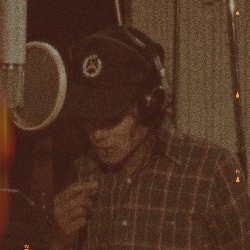

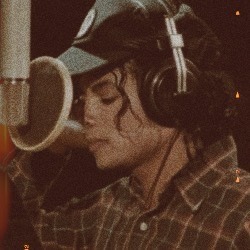


Pairing: Michael Jackson x fem!reader
Synopsis: After weeks of no intimacy due to his demanding schedule you decide to pay Michael a visit at the studio in a short skirt. Oblivious to the effects it has on him you face the consequences.
Tags: dom!michael, sub!reader, slight exhibitionism, doing it standing up, against a wall, oral (fem receiving), fingering, pussy slapping, p in v, rough sex, creampie, orgasm denial.
Word Count: 3.9k
Requested: yes/no
Author’s Note: Sorry for not being very active these last couple of weeks, uni has started again and it's kicking my butt.
Links: navigation | masterlist | taglist

As you walk through the bustling halls of the studio, your heart swells with anticipation, eager to reunite with your husband amidst his intense recording sessions for his latest album. Despite the excitement, a tinge of concern lingers in your mind, a nagging feeling that something has shifted in his demeanor lately. The late nights and early mornings, the relentless pursuit of perfection—it's all taken a toll on both of you.
You've noticed the change in him, how he's become more distant, more consumed by the music than ever before. It weighs heavily on his conscience, knowing he's neglecting the one person who means the world to him, you. But amidst the chaos of the studio, with deadlines looming and pressures mounting, finding time for each other has become increasingly challenging.
Determined to lift his spirits and offer some semblance of support, you've made the decision to surprise him at work, hoping to inject a bit of joy into his day. As you approach the door to the recording booth, the familiar sound of his voice washes over you, filling you with warmth and reassurance. Inside, you catch a glimpse of him through the slightly ajar door.
“Alright, Q roll the tape again, let’s move on to the adlibs now,” you hear Michael call out to Quincy Jones, the legendary producer, from the booth. His voice seems slightly strained from being in the studio before the sun was even up.
You watch as he readjusts his headphones on top of his head and clears his throat. The melody starts to play throughout the room and he begins to let the music overtake his body. His passion and dedication is evident in every note he sings. His curls bounce with each movement, his expression focused yet illuminated by the sheer love for his craft.
While he does so you look around the room and you spot a familiar face: Janet, sitting on the couch along with a few more people, Michael's colleagues you assume. She suddenly catches your eyes and smiles warmly, gesturing for you to come in and make yourself known. Gently pushing the door open, you enter the room with cautious steps, mindful not to disrupt the creative flow. Taking a seat beside Janet, you exchange greetings and exhale softly, allowing yourself to sink into the comfort of the couch.
"I'm surprised Mike didn't tell me you were coming," Janet whispers, her voice tinged with curiosity as she leans in closer to you, her words barely above a whisper in the bustling studio.
A wistful sigh escapes your lips as you gaze across the room at your beloved Michael, his figure immersed in the creative process, unaware of your presence. "I wasn't planning to, I just... needed to see him," you confess, longing evident in your voice as you speak of him.
Janet's expression softens, her hand finding its way to your arm in a gesture of comfort. "I know he's been a little distant lately. He's like that with all of us too. Hasn't even called Mom in a while, she's starting to worry," she confides, her concern mirroring your own.
You nod in understanding, your gaze still fixed on Michael, unable to tear yourself away from him. "You miss him, don't you?" Janet's voice interrupts your reverie. she looks at your outfit, immediately noticing the short skirt you’re wearing. You finally take your eyes off Michael and knit your brows in confusion. Before you can respond, she nudges you lightly with her knee, drawing attention to the tantalizing view of your legs. Heat floods your cheeks as you glance down at your exposed thighs.
“Oh- it’s, it’s not like that” you feel your cheeks heat up as you protest weakly, fingers fidgeting with the hem of your skirt in a futile attempt to cover more skin.
A mischievous glint dances in Janet's eyes as she smirks knowingly. "Oh, spare me the excuses. It's obvious you two haven't fucked in a while," she teases, earning herself a playful swat from you.
"That may be true, but it's not why I'm wearing this, okay?" you retort, a hint of defensiveness creeping into your tone. "It's just a cute skirt," you add, though the words sound feeble even to your own ears.
Janet rolls her eyes in mock exasperation, but the teasing light in her gaze softens into understanding. "Whatever you say," she concedes with a knowing smile, letting the matter drop for now.
With a shake of your head, you try to refocus your attention on Michael. When you turn your head towards the booth you find his deep brown eyes already looking at you. A soft smile curves your lips as you wave at him, feeling a flutter of joy in your chest at the sight of his chuckle in response.
As Michael announces a short break over the microphone, Janet nudges you once more, a knowing smirk playing on her lips. Taking the hint, you rise from your seat, your heart racing with anticipation as you make your way towards the soundproof booth, eager for a moment of intimacy with your beloved husband.
Passing by Quincy on your way, you exchange a polite greeting which he returns automatically before whipping his head back quickly, his surprise evident as he realizes you've managed to slip past him unnoticed.
As you slip into the soundproof booth with Michael, the outside world fades away, leaving just the two of you cocooned in a bubble of intimacy. With a flick of his wrist, he turns off the microphone, ensuring that your conversation remains private. “I’ve missed you,” you whisper and wrap your arms around him, your head snuggling into his chest.
He returns the affection, feeling how much you’ve been craving his attention that he's unpurposefully depraved you from. Michael returns your affection, pulling you closer, his head resting atop yours as he breathes in the scent of your shampoo, a comforting reminder of home amidst the chaos of the studio. "I know, baby, I'm sorry for neglecting you these past few weeks. You know how hectic it gets here sometimes," he murmurs into your hair, his hand tracing soothing circles on your back.
You nod in understanding and exhale. The tension of your separation melting away in his arms. "I'm happy you came," he adds, his voice filled with genuine warmth, and you can't help but smile at the sincerity in his words.
"Good, I was worried. Didn't want to distract you too much," His response is a playful squeeze of your waist, accompanied by a tsk. "You could never, sweetheart," he counters, his affectionate gaze lingering on you.
"Although your little get-up might distract somebody else here," he remarks, his voice dropping to a deeper, more suggestive tone. Your eyebrows knit together in confusion as you lean back slightly, meeting his gaze. His eyes trace over your body, settling on your short skirt, and you can feel the heat rising to your cheeks as you realize his intentions. You can see his pupils dilating even in the dim space. You try to release yourself from his arms to pull down your skirt but before you can do that, he tightens his grip around you, preventing your escape.
"Not so fast, baby. You'll have some explaining to do when we get home," he teases, a playful glint in his eyes. "I knew how desperate you can get after not being touched for a bit, but I didn't expect you to prance around here in your tiny skirt, trying to make me jealous," he continues, his tone sending shivers down your spine and causing you to press your thighs together instinctively.
"What? No, no, Michael, I'm not—" you begin to protest, but he cuts you off by cocking his head to the side.
"Shh, didn't you notice how they were looking at you?" he murmurs, tilting his head toward the glass window. Your eyes follow his gaze, catching the embarrassed glances of his producers before they hastily avert their eyes, and you flush with embarrassment, realizing the unintended consequences of your outfit choice. “Practically drooling over you like perverts.”
As you turn back to face Michael, his gaze pierces through you, sending a shiver down your spine. "Thought you could rile me up, hm?" he challenges, his voice dripping with a potent mixture of authority and desire. You open your mouth to respond, but your mind is too preoccupied with the overwhelming sensation pulsing between your thighs. God, you’ve missed his touch so much. Missed him fucking you spineless on your shared bed over and over again. Your mind drifts and you can almost feel the weight of him atop you, stretching you on his meaty cock. You can practically feel his tip rubbing against your clit deliciously.
Reality snaps you back to the present as Michael's strong hands grip your hips, pinning you against a secluded corner of the booth, a blind spot hidden from prying eyes. "I asked you a question, didn't I? Or have you forgotten your manners?" he demands, his fingers firm against your jaw as he lifts your gaze to meet his.
Stuttering, you struggle to gather your thoughts, your arousal evident in the flush of your cheeks and the erratic beat of your heart. "Aw, poor baby," he coos, his tone teasing yet tinged with a hint of affection, "can't even string a few words together." You whimper in frustration, attempting to focus amidst the overwhelming sensations coursing through your body, but the slickness between your legs betrays your desire.
"...Didn't wear it on purpose," you manage to whisper, your voice barely audible. Michael grins, bringing his face tantalizingly close to yours, his thumb tracing your bottom lip. "Speak up, sweet girl. Can't hear you," he taunts.
Your gaze drifts to the exposed skin of his neck, the unbuttoned collar of his shirt a tempting invitation for your hungry eyes. You repeat yourself once more, this time slightly louder for him to hear which satisfies him. "What am I supposed to do with you, hm? I thought you were my good girl, wanted to spoil you for being so patient, but you've ruined that for yourself now," he muses, his tone laced with a mixture of disappointment and arousal.
you look at him with needy eyes as you hear the word spoil. “I’ll be good, I promise,” you plead.
"Of course you will, or else I'll worsen the punishment," he warns. Before you can react, he spins you around, pressing you against the wall and hiking up your skirt to your waist. Gasping at the sudden change, you look over your shoulder but he groans and twists your head back towards the wall. “Be good,” he commands and sinks down to his knees.
Michael's breath hitches as his gaze falls upon your panties, dampened by your arousal. With a knowing smirk, he nudges your legs apart, revealing the tantalizing fabric clinging to your folds. "So predictable," he muses silently to himself, his thumb pressing against your clothed clit. A whimper escapes your lips, followed by the urgent bucking of your hips, desperate for more friction. He grumbles in response, delivering a firm spank to your pussy, eliciting a yelp from you as you jolt forward, your face pressed into the wall.
"Don't be greedy," he admonishes.
Hooking his fingers at the sides of your panties, he slowly pulls them down your trembling legs, stuffing them into his pocket without hesitation. Leaning closer, he spreads your cheeks, his gaze fixated on your soaked cunt. He licks his lips in anticipation before planting heated kisses on the skin, tantalizingly close to where you crave him most. You fight the urge to beg for more, knowing it will only lead to the opposite of what you need.
Without uttering a word, he wraps his full lips around your throbbing clit, sucking it into his mouth with precision and pulling away with a pop. A whimper escapes your lips as you press your palms against the wall, your body trembling with anticipation. Praying that nobody’s trying to sneak a peek.
Michael watches intently as your sensitive nub pulses under his ministrations, his own desire threatening to consume him. He dives back and flicks his tongue against the slick bundle of nerves. He sends waves of pleasure coursing through your body, your breath hitching with each exquisite sensation.
Lost in the bliss of the moment, Michael savors the taste of you on his tongue. Lapping at your glossy folds with his eyes closed. The sweet yet tangy flavor makes him dizzy and for a moment, he entertains the thought of forgetting about the naughty little skirt, abandoning all restraint, and indulging in the primal urge to make you cum over and over again.
But the sound of your sweet whines snaps him back to reality, reminding him of the delicate balance between pleasure and control. Reluctantly detaching his mouth from your throbbing clit, he shifts his weight onto his calves.
"Please... fuck, please, Michael," you plead, your words tinged with desperation and arousal, the fear of being discovered only adding to the intensity of the moment. Making you unable to string coherent sentences together.
"What did I say, hm?" His voice is a low growl. "Is it that difficult to follow simple rules, or are you being bad on purpose?" Another sharp slap lands on your drooling cunt, eliciting a cry of both pain and pleasure from you.
You shake your head, unable to trust your voice as you struggle to maintain your composure. Your legs tremble involuntarily, aching to close, but you know better than to disobey so you keep them spread. Michael, ever the attentive lover, notices the tension in your body and grins in satisfaction.
With deliberate care, he brings his right hand to your twitching inner thighs, his touch soft and soothing against your heated skin. The gentle caresses help to calm your racing heartbeat, even as the anticipation continues to build. Meanwhile, he palms his hard cock through his trousers, the friction adding to the heat of the moment.
His fingers move with practiced ease, scissoring against your warm, gooey walls, sending waves of pleasure coursing through your body. Your eyes roll back into your skull as your pussy greedily sucks his fingers deeper, desperate for the long-awaited stimulation it craves.
Oh, how much you've missed this. While you've tried to satisfy your desires in the past weeks, desperately rubbing your clit raw, nothing compares to the feeling of being touched by him. And now that your poor neglected pussy is finally receiving some much needed attention you can’t help but gush around his fingers. The wet squelching noises only serve to heighten the euphoric sensation.
You bite your lip to suppress the filthy noises threatening to escape your mouth, determined to maintain your composure. Despite the overwhelming pleasure, you resist the urge to look back at Michael, to look at his face as he pleases you, so you try to be a good girl, you keep your eyes fixed on the wall in front of you. Your hand trembles as you contemplate whether or not you’re allowed to play with your puffy pearl that’s aching for some loving.
As his gaze locks onto your wandering hand, inching dangerously close to your center, he delivers a stern warning: "Don't even think about it." You whimper in frustration, complying by bringing that hand under your shirt to play with your tender breasts, seeking some form of relief from the overwhelming arousal coursing through your body.
He continues to revel in the moment, his eyes glued on your glistening cunt, betraying the depth of his desire. Despite his stoic exterior, he's missed you more than words can convey. Countless times, he's found himself excusing himself from the studio to silently relieve his pent-up longing, imagining the sensation of stretching your pretty hole. Yet, afterwards instead of the satisfying sight of his release dripping out of you, he was met with the sight of his sticky cum on the floor.
Glancing down at his stiff cock, straining against the fabric of his trousers, he realizes he's reached his limit. He’s been holding himself back from ripping your clothes off from the second you walked into the booth with that adorable smile. With your slick coating his palm, he decides he can't wait any longer.
Though you pout from the sudden lack of stimulation, the sound of him rising to his full height, his warm minty breath tickling your ears, sends shivers down your spine. Then, the unmistakable sound of a zipper being undone and shuffling fills the air, followed by the sensation of his leaking tip at your entrance.
You gasp as his precum smears across your folds, mingling with your own juices in a tantalizing blend. His hand wraps around his fat length and guides his bulbous tip up and down your slick slit with agonizing slowness. With deliberate care, he pulls back his foreskin, revealing his sensitive cockhead to your needy heat, a silent promise of the pleasure to come.
His palm presses against the wall in front of your face, a silent command for you to lean into it. It's not the first time he's taken you against a wall like this, but this time feels different, more tender, knowing how fervently he's going to take you in just a moment. The juxtaposition drives you crazy. He steals a quick glance at the window, ensuring that no prying eyes are watching, before returning his full attention to you.
With a swift, fluid movement, he invades your tight hole, burying more and more of his meaty cock inside you without giving you a moment to adjust. As he fully sinks into you, his coily pubic hair brushing against your cheeks, he snakes his other arm around your middle, pulling you closer to him in a possessive embrace.
In no time, he's slamming his hips against yours with a fervor that leaves you gasping, your mouth hanging open in a silent plea for more. Your hands scramble to grasp onto him for support, seeking some anchor amidst the overwhelming sensation of being filled to the brim with his massive cock. Each thrust sends a jolt of pleasure coursing through your body, the slight sting of his size stretching you to your limits mixing with the electrifying pulse of desire. Heavy balls slap against your clit as you hold onto the last bits of your dignity, before turn into a moaning mess for him.
"Missed me, sweet girl?" His gravelly voice whispers right behind your ear, sending shivers down your spine and making your eyes flutter. You nuzzle your face against his hand, lips brushing against his skin in a tender gesture of affection, even amidst the raw intensity of your coupling. With each snap of his hips, your body surges forward, surrendering to the pleasure that threatens to consume you entirely. As you trail kisses up his forearm, he smiles at the gesture, goodness you make it so hard to stay mad at you.
With his front pressed firmly against your back, he continues his relentless assault on your eager body, his cock plunging into your slick walls with a merciless rhythm that leaves you powerless to resist. Uninhibited, pornographic moans spill from your lips, echoing in the dimly lit room as he drives you closer to the edge of ecstasy. His movements grow more animalistic, his groans mingling with yours as he presses kisses to the nape of your neck, stoking the flames of desire that threaten to consume you both.
"Of course you did," he taunts, his words laced with a mixture of amusement and arousal as he notices your legs beginning to give way beneath you. "Look at you…can barely stand on your own two feet."
Your high pitched whines ring in his ears, the unmistakable scent of sex hanging heavy in the air as your pussy clenches around his thick cock, craving release. his veins dragging deliciously against your warm walls, molding your cunny back to his shape. Whilst he pounds his shaft in and out of you with each roll of his hips his round balls slap against your pulsing nub. intensifying the stinging sensation that drives you closer to the brink of orgasm.
"Mi-Michael, I'm close…oh god, fuck, gonna cum…" you manage to choke out between ragged moans, your entire body trembling with the impending release. Your eyebrows furrow, and tears prick at the corners of your eyes as the overwhelming pleasure threatens to consume you entirely, your nails digging into his skin in a desperate attempt to ground yourself amidst the ecstasy.
"Gonna stuff you full of my cum, is that what you want?" His voice is deeper now, laced with a primal urgency that matches the frantic pace of his thrusts. You nod eagerly, your breath coming in short gasps as you cling to him, your entire being consumed by the need for release. "Yes…yes, please…"
Before you can fully comprehend what's happening, you feel the hot spurts of his cum painting your walls, each thick glob of creamy seed filling you up completely, leaving no empty space as his essence dribbles out of you and down his balls, creating a sticky mess. “God…such a pretty pussy, yeah, that’s it baby, take it.” His groans of pleasure echo in the room as he sloppily thrusts, your cunt milking him fully before he finally pulls out, his cock softening.
As he pants behind you, his breath tickling your neck, you squeeze around nothing, whimpering in confusion. Ignoring his cum oozing out of you, you finally dare to turn your head around. You watch in a daze as he stuffs his wet cock, your slick still clinging to his skin, back into his boxers and pulls up his trousers.
"...What...I-" you stutter, trying to clear your head, only for him to cut you off with a mocking pout and chuckle.
"What, baby? You thought I was gonna let you cum?" He smirks and fixes his hair. Looking so infuriatingly composed as if he hadn't just rocked your world while leaving you a disheveled mess with his seed leaking down your inner thighs.
"But, but you-" you start again, but he interrupts, turning you around carefully and pulling your skirt down lower than it was previously.
"None of that, don't be ungrateful. You're gonna tell me you didn't like getting your sweet pussy stretched, hm?" His tone is teasing yet firm as he tries to make you look as presentable as possible.
"I did, I just thought you'd...you know..." Your words trail off as you struggle to ground yourself, your gaze meeting his through half-lidded eyes.
"Thought I'd let you cum?" You weakly nod in response, swallowing hard.
"Foolish girl," he murmurs, his lips quirking into a small frown as you squeeze your thighs together, still feeling your clit throbbing for release.
"Come on now, let's go. I'll teach you a real lesson when we get home." He wraps his arm around your body, patting his pocket to check for your panties, not wanting Quincy to find them again and scold him like last time.

© michaelsfavgirl 2024
Taglist: @heartss444mj @yeriminist @yeaiamme2 @helloaugustmoon @cinnamoncunt @theladyofmylife @minekarina @kionaaa @theskinniestjackson-denny @youronlyonenini @graciegizmo3184 @theasexual-jackson @mrsmikaelsxn @fallinlovewithevil @armasbw @b3rk1ey
#kate's writing#michael jackson#michael jackson x reader#michael jackson x fem!reader#smut#x reader#fanfiction#fanfic#michael jackson imagine#king of pop
383 notes
·
View notes
Text
so im sure everyones fully well aware of the magic 8 ball site fob is using to promote a contest to win some tickets to see them in nashville. the little 8ball widget theyve got in browser is also modeled on the physical 8ball that they had in the vip merch packages for tourdust's first leg, which is cool! but of particular note is the way that, to fill out the contest form, you have to pick your favorite fall out boy songs. and the sheer breadth of what is allowed is...interesting? it's not cohesive by any means, but it is really wild the selection of songs they have here because not all of them are fob songs. in fact, quite a few of them aren't.
i went directly to the source code and got a full list of all possible songs that you could input (which you can check for yourself by right-clicking and selecting "view source"). i'm going to list them here for archival purposes, with a few notes/explanations cause some of these are WILD.
there are 187 songs total listed.
bolded songs indicate songs that are demos or never received an official release
italicized songs are songs by other bands
underlined songs indicate songs that are covers
songs with an asterisk beside them (*) indicate they are from patrick's solo catalogue. two asterisks (**) are for pete's.
additional commentary by me will be [in brackets]
20 Dollar Nose Bleed 27 7 Minutes in Heaven (Atavan Halen) 7-9 Legendary A Little Less Sixteen Candles, a Little More "Touch Me" A Nice Myth [one of the earliest fall out boy demos, found on their first ep, and only the casette version at that] Allie* Alone Together Alpha Dog America's Suitehearts American Beauty/American Psycho (song) American Made Art of Keeping Up Disappearances As Long as I Know I'm Getting Paid* Austin, We Have a Problem Baby Annihilation Bad Side of 25* Bang the Doldrums Beat It Big Hype* Bishops Knife Trick Bob Dylan Bounce [this is a song that came out on then-Decaydance labelmates The Cab's debut record, Whisper War, which patrick produced. he has writing credit and also is credited with background vocals (and also shows up in the music video)] Caffeine Cold Calm Before the Storm Centuries Champagne for My Real Friends, Real Pain for My Sham Friends Champion Check Your Phone** Chicago is So Two Years Ago Church City in a Garden Coast (It's Gonna Get Better)* Coffee's for Closers Cryptozoology* Cute Girls* Cyanide** [this is a nothing,nowhere song that pete did some spoken word parts and backing vocals on] Dance Miserable* Dance, Dance Dead on Arrival Dear Future Self (Hands Up) Death Valley Deep Blue Love* [song patrick did for the indie short film "spell"] Demigods Disloyal Order of Water Buffaloes Don't You Know Who I Think I Am? Electric Touch [the (in?)famous taylor swift song patrick featured on] Eternal Summer Everybody Wants Somebody* Explode* Fake Out Fame Less than Infamy Favorite Record Fellowship of the Nerd [this is an alternate title for world's not waiting, as far as i can tell] Flu Game Flu Game [yes flu game is listed twice for some reason] Footprints in the Snow [demo from the Llamania ep] Fourth of July From Now on We Are Enemies G.I.N.A.S.F.S. Get Busy Living or Get Busy Dying (Do Your Part to Save the Scene and Stop Going to Shows) Ghostbusters (I'm Not Afraid) Golden Grand Theft Autumn/Where Is Your Boy Greed* Grenade Jumper Grow Up and Be Kids [this song is on The Cab's sophomore album Symphony Soldier, which release after they left decaydance. nonetheless, pete does have some writing credits on it. give it a listen and you'll hear for yourself in the first 10 seconds or so] Growing Up Hand Crushed by a Mallet [this is a remix of the 100gecs song of the same name; patrick did some vocals for it] Hand of God Have I Got a Gift for You* [song patrick did for the horror movie black friday] Headfirst Slide into Cooperstown on a Bad Bet Heartbreak Feels So Good Heaven's Gate Heaven, Iowa Hold Me Like a Grudge Hold Me Tight or Don't Homesick at Space Camp Honorable Mention Hot to the Touch, Cold on the Inside Hum Hallelujah I Am My Own Muse I Don't Care
I Got Nothing, But You Got Something [this is the one that really perplexes me. there's no evidence of this song actually existing, other than an unverified genius post and an article on a single fandom wiki. it is inexplicably listed here despite its very existence being questionable at best.]
I Slept with Someone in Fall Out Boy and All I Got Was This Stupid Song Written About Me I Wanna Dance with Somebody (Who Loves Me) I'm Like a Lawyer with the Way I'm Always Trying to Get You Off (Me & You) I've Been Waiting [this is technically a lil peep song with fall out boy as a feature] I've Got a Dark Alley and a Bad Idea That Says You Should Shut Your Mouth (Summer Song) I've Got All This Ringing in My Ears and None on My Fingers Immortals Irresistible It's Hard to Say 'I Do', When I Don't It's Not a Side Effect of the Cocaine, I Am Thinking It Must Be Love Jet Pack Blues Just One Yesterday Lake Effect Kid (song) Lake Shore Drive [this is a song patrick covered on the piano at wrigley, first night of tourdust] Love from the Other Side Love Will Tear Us Apart Love, Selfish Love* Love, Sex, Death Lullabye Mad at Nothing* Miss Missing You Moving Pictures My Heart Is the Worst Kind of Weapon My Songs Know What You Did in the Dark (Light Em Up) New Dreams [this is a bonus track on pax am days, a naked rayguns cover] Nobody Puts Baby in the Corner Novocaine Of All the Gin Joints in All the World One of Those Nights [another song from the cab's whisper war. this one has patrick doing vocals very prominently] Open Happiness [this was a huge collaborative piece done for a coca cola commercial. patrick was on it along with big names like cee lo green, janelle monae, and labelmates travie mccoy and brendon urie] Our Lawyer Made Us Change the Name of This Song So We Wouldn't Get Sued Parker Lewis Can't Lose (But I'm Gonna Give It My Best Shot) Past Life [llamania ep] Pavlove People Never Done a Good Thing* Porcelain* Pretty in Punk Rat a Tat Reinventing the Wheel to Run Myself Over Roxanne Run Dry (X Heart X Fingers)* San Diego [this is a blink-182 song that patrick did some writing for] Saturday Saturday Night Again* Save Rock and Roll (song) Sending Postcards from a Plane Crash (Wish You Were Here) She's My Winona Short, Fast, and Loud Snitches and Talkers Get Stitches and Walkers So Good Right Now So Much (For) Stardust (song) So Sick [this is a song patrick has exclusively covered live, so it's a fascinating inclusion] Sober [another blink-182 song patrick did some writing for] Sophomore Slump or Comeback of the Year Star 67 Stay Frosty Royal Milk Tea Sugar, We're Goin Down Summer Days (song) [this is a martin garrix song patrick lent some vocals to] Sunshine Riptide Super Fade Switchblades and Infidelity Tell That Mick He Just Made My List of Things to Do Today The "I" In Lie* The (After) Life of the Party The (Shipped) Gold Standard The Carpal Tunnel of Love The Kids Aren't Alright The Kintsugi Kid (Ten Years) The Last of the Real Ones The Mighty Fall The Music or the Misery The Patron Saint of Liars and Fakes The Phoenix The Pink Seashell The Pros and Cons of Breathing The Take Over, the Breaks Over The World's Not Waiting (For Five Tired Boys in a Broken Down Van) This Ain't a Scene, It's an Arms Race This City* Thnks fr th Mmrs (song) [for some reason the site specifies song here, despite that not being necessary. the only other times this distinction is relevant is when songs share a title with their albums, i.e. save rock and roll] Thriller Tiffany Blews Twin Skeleton's (Hotel in NYC) Uma Thurman Untitled 1 (Colorado Song) Untitled 2 (Jakus Song) [both of these are recently released tttyg era demos] W.A.M.S. We Didn't Start the Fire We Don’t Take Hits, We Write Them [this is a song that famously was only ever performed live. we don't have a studio recording or even a demo, as only live versions exist] We Were Doomed from the Start (The King is Dead) West Coast Smoker What a Catch, Donnie What a Time To Be Alive What's This? When I Made You Cry* Where Did the Party Go Wilson (Expensive Mistakes) Wrong Side of Paradise [llamania ep] XO You're Crashing, But You're No Wave Young and Menace Young Volcanoes Yule Shoot Your Eye Out
in conclusion i have no idea who compiled this list. it doesn't include every song patrick and pete have ever touched (notice the lack of gym class heroes, cobra starship, and hush sound discography) but it has a really weird selection of songs. i mean, blink songs patrick wrote on?? its bizarre.
anyway do you think if we mass request swing me by the rafters they'll have to do it
#fall out boy#tourdust#*making poasts#trying to format this conventionally BROKE THE POST so i did my best#i burned my grilt cheese typing all this up pls appreciate it#the weird break in the middle is cause otherwise it wouldnt post. mea culpa.
440 notes
·
View notes
Text

This took a while working on it on and off but say hi to Basim in the supernatural folk au! I’m mostly gonna keep drawing these guys in modern-wear for the sake of ease and character interactions in a low stakes environment I think lmao
Basim is a Shâd’havâr, a legendary horned creature that exists in both Arab and Persian bestiaries and texts (as well as some recordings relating to Iraq, so I wanted to make sure he would be regionally accurate). It is said that when wind is blown from the north of the horn, it would flow through the branches and holes and produce music so moving and harmonious that animals would gather around to listen— when blown from the other direction, it would create music so melancholic that it would drive those who heard it in a state of grief.
Thought this might be fitting for Basim due to the double edged nature of his backstory, where we’re glad to know him finally for who he truly was but also mourning that character since he’s technically now gone/replaced by another.
Some of my favorite images od the Shâd’havâr under the cut while reference gathering!






179 notes
·
View notes
Text
Beacon of Hope no more - ANGST
Bakugo x Reader
The crimson stain spread across her chest, blooming like a monstrous flower against the clean white of her dress.
Y/n.
Her name echoed in Katsuki’s mind, a broken record skipping on the same agonizing track. He knelt beside her, trembling as he tried to stop the bleeding, but it was useless. Her eyes, usually sparkling with laughter and life, were dimming, the light fading like a dying ember.
“Ka-tsuki…” she whispered, her voice barely audible. A single tear escaped and traced a path through the blood smudging her cheek.
“Y/n, no. Be strong. Please,” he pleaded, his voice cracking. He, the city’s protector, the beacon of hope, was reduced to a sobbing mess, his world crumbling around him.
“I… I love you,” she breathed, her gaze fixed on his. Then, her eyes fluttered closed, and her hand, which he held so tightly, went limp.
A rough scream tore from Katsuki's throat, a sound of pure, pure agony. It echoed through the shattered remnants of what had been their peaceful afternoon date, a contrast to the gentle breeze and the birdsong that had filled the air moments before. He cradled Y/n’s lifeless body, his tears falling onto her blood-soaked dress, mixing with the crimson already there.
Rage, hot and blinding, began to simmer within him. It coiled in his gut, a constricting feeling in his heart and choking him with its fury. He looked up, his gaze falling on the figure standing amidst the chaos, a cruel smile playing on his lips.
Darius.
The man who had produced this tragedy. The man who had stolen Y/n from him.
Darius, the self-proclaimed 'Architect of Chaos,' had been his nemesis for years. Their battles had become legendary, a clash between light and darkness, order and anarchy. But this… this was different. This wasn’t a battle for the city, this was personal.
This was for Y/n.
Katsuki rose to his feet, his movements stiff and robotic. The spark of heroism was extinguished, replaced by a cold, burning fury. He looked at Darius, his face a mask of grief and rage.
“You…” he began, his voice low and menacing, “You took her from me.”
Darius chuckled, a dry, rasping sound. “She was a weakness, Dynamight. A vulnerability you couldn’t afford. I simply… removed it.”
Katsuki’s fists clenched, his knuckles turning white. The hero within him, the one who always strived for justice, the one who believed in redemption, was silenced. The only thing that remained was a primal need for revenge, a thirst for blood that consumed him entirely.
He took a step forward, then another, his pace quickening with each stride. The air crackled with a raw, untamed power, a darkness that emanated from him.
“You want to see a villain?” he snarled, his voice dripping with venom. “I’ll show you one.” The words hung in the air, heavy with menace, a chilling promise of vengeance.
Darius, for the first time, seemed to falter, a flicker of unease crossing his features. He had pushed Katsuki to the edge, but he hadn't anticipated the monster that lurked beneath the surface of him.
Katsuki lunged, his speed and ferocity catching Darius off guard. He unleashed a flurry of blows and explosions, each strike fueled by his rage, each punch a testament to his grief.
Darius, though powerful, was overwhelmed by the sheer brutality of Katsuki’s attack. He stumbled back, his defenses crumbling under the attack.
"You think you can hurt me?" Darius spat, summoning his powers. Tendrils of dark energy snaked out from his hands, lashing at Katsuki, but he was impenetrable to them.
His pain, his loss, had made him an engine of destruction.
Katsuki grabbed Darius by the throat, his grip like iron. He lifted him off the ground, his eyes burning with a cold fire. Darius gasped for air, his face turning purple.
“Y/n…” Katsuki whispered, his voice hoarse, “She was everything to me. And you… you took her away.” He tightened his grip, the sound of cracking bones filling the air.
Darius struggled, his dark energy flickering and fading, unable to penetrate the wall of rage that surrounded Katsuki.
“You… you’ll pay,” He growled, his voice filled with a chilling calm. He threw Darius against a nearby tree, the impact sending tremors through the ground causing him to crumpled to the ground, groaning in pain.
Katsuki didn’t stop. He was a whirlwind of fury, a force of nature unleashed. He rained down blows on Darius, each strike more brutal than the last. He didn’t care about justice, he didn’t care about the law. All he cared about was making Darius suffer, making him feel the same pain that he felt, the same emptiness, the same loss.
Darius, battered and broken, could barely defend himself. He had underestimated Katsuki's love for Y/n, underestimated the depth of his grief, and underestimated the monster he had created.
Katsuki stood over Darius, his chest heaving, his body trembling. He looked down at the man who had destroyed his life, the man who had taken everything from him. He could feel the darkness within him, the corrupting influence of his rage. He had become what he had sworn to fight against.
He had become a villain.
He raised his hand, ready to deliver the final blow, to end Darius’s life, to finally quench his thirst for revenge.
But then, he hesitated. He saw Y/n’s face in his mind’s eye, her gentle smile, her kind eyes. He remembered her words, her unwavering belief in him, her faith in the hero he was.
He lowered his hand, his fingers trembling. He couldn’t do it. He couldn’t become a murderer. He wouldn’t dishonor Y/n’s memory by succumbing to the darkness.
He turned away from Darius, his body shaking with the effort to contain his rage. He walked away, leaving Darius broken and defeated on the ground. He didn’t know what the future held for him, but he knew one thing, he would never be the same.
Y/n’s death had changed him, shattered his world, and unleashed a darkness within him that he knew would forever be a part of him.
He was no longer just a hero, he was something more, something darker, something broken. The city had lost its protector, and in his place, a new kind of vigilante was born, one fueled by grief, driven by revenge, and haunted by the memory of the woman he loved. He was no longer the beacon of hope.
"Where... Are the heroes?..."
#bakugou katsuki#bnha bakugo katsuki#mha bakugou#bakugou x reader#katsuki bakugo mha#katsuki bakugo x reader#bnha bakugou#katsuki x you
88 notes
·
View notes
Text
Michael Jackson featuring Slash - Give In to Me 1993
"Give In to Me" is a song by American singer-songwriter Michael Jackson, released as the seventh single from his eighth studio album, Dangerous (1991). Released in February 1993 - in Europe, Australia and New Zealand only - the song peaked at number one in New Zealand for four consecutive weeks and at number two on the UK Singles Chart. The track was written and produced by Jackson and Bill Bottrell, and features Guns N' Roses guitarist Slash. Stylistically, "Give In to Me" is a hard rock and heavy metal ballad.
The music video features Jackson performing the song on stage at an indoor rock concert with ex Living Colour bassist Muzz Skillings, Guns N' Roses guitarists Slash and Gilby Clarke, as well as the band's touring keyboardist Teddy Andreadis and legendary session drummer Tony Thompson. It was shot on June 25, 1992, in Munich, Germany, just two days before the opening concert of the Dangerous World Tour.
The album Dangerous debuted at number one on the US Billboard Top Pop Albums chart and in thirteen other countries, selling 5 million copies worldwide in its first week and went on to be the best-selling album worldwide of 1992. By 1994 Dangerous had sold 25 million copies worldwide. It was certified 8× Platinum by the Recording Industry Association of America (RIAA) in August 2018.
"Give In to Me" received a total of 77,1% yes votes! Previous Michael Jackson polls: #45 "Will You Be There", #114 "Why", #220 "Blame It on the Boogie". Previous polls featuring Slash: #159 "I'm Just Ken".
youtube
515 notes
·
View notes
Text

Japan’s fifth empress regnant, Genshō (680-748), ruled after her mother, Empress Genmei. Like her mother, she was a protector of culture and a reformer.
From Mother to Daughter
When Empress Genmei abdicated in 715, she passed the throne to her daughter instead of her sickly and too-young grandson. This created a unique case in Japanese history, marking the Nara period as the pinnacle of female monarchy in Japan. Unlike previous female sovereigns, Genshō had never been married before.
Her reign marked the height of the Nara state. One of her major achievements was the compilation of the Yōrō code in 718, a faithful copy of the earlier Taihō code. It was widely distributed throughout the country, ensuring effective central administration. This code became the legal basis of government for the next two centuries.
Cultural Contributions
Like her mother, Genshō made significant cultural contributions. In 720, the Nihon Shoki, a work aiming to produce a national history of Japan and the imperial family, was completed and officially sanctioned. Using diverse sources such as Chinese and Korean documents, government records, and house journals, it covered a longer period than the earlier Kojiki, including the reign of Empress Jitō, in a scholarly tone.
Interestingly, the two chronicles linking the imperial family to the sun goddess Amaterasu were sanctioned and promoted by female rulers.
Retired Empress
Genshō spent nine years on the throne. She stepped down in 724 to make way for her 23-year-old nephew, Emperor Shōmu (701-756). Unlike her mother, Genshō did not become a nun. She assumed the title of Daijō Tennō (or "retired emperor") and remained active for another 24 years.
My Ko-Fi
Further reading
Shillony Ben-Ami, Enigma of the Emperors Sacred Subservience in Japanese History
Tsurumi Patricia E., “Japan’s early female emperors”
Aoki Michiko Y., “Jitō Tennō, the female sovereign”,in: Mulhern Chieko Irie (ed.), Heroic with grace legendary women of Japan
#empress gensho#japanese empresses#history#historyedit#women in history#women's history#japan#japanese history#8th century#nara period#historyblr#historical figures#queens#powerful women#empresses#historical women
96 notes
·
View notes
Text
The Romantics 🎸 | Pete Mitchell Imagine
Part of my 'Y/n & The Romantics' TGM AU verse

Part 1 | Part 2 | Part 3 | TGM Masterlist
Characters & Pairings: Captain Pete ‘Maverick’ Mitchell x 80s Rockstar!reader (romantic), Bradley Bradshaw x reader (mother/son-type relationship), Dagger Squad (platonic)
content warnings: Fluff, slight profanity, flirtatious banter, light suggestive content, mentions of past drug use. pop culture references | Female!reader (she/her) | wc: 5k
Requested 📨 yes/no (for @fangirlvibez) 🩶
Premise: After two years since getting the band back together, Y/n and The Romantics have got the opportunity most artists dream of getting when they've achieved legendary status in their career: a documentary film. Recalling the days of discovery, early stardom and the love she found along the way, frontwoman & daughter of Rock n' Roll Y/n L/n-Mitchell writes a love letter to not only her fans, but the pilot who captured her heart...and the little girl with a voice of an angel who broke away from God to become a rockstar.
Note: I've said it and I'll say it again, writing dagger squad x famous!reader is in my top 3 pairings I've written for, and it makes me so happy that after two plus years of doing them, you guys love them and continue to request them--even when I've been slacking on getting through requests. This request was the spark I needed and once I started typing, it never stopped. Again (like every note in my works the past several months) I'm sorry for the wait and I hope this gives you everything you hoped for. 🩶
---------------------------------------
3….2….1…
“Are we rolling?” Y/n laughed, apologizing to the producers and crew in front of her when she realized they had already begun filming when she was off in la la land singing ‘How Will I Know,’ by Whitney Houston under her breath while an assistant made sure the mic was secured on her t-shirt.
“Yes, Ms. Y/n,” the lady in an all red pantsuit chuckled, adjusting her headset and motioning for the cameraman to not stop the camera. “But don’t worry we’ll edit it out.”
They were not going to edit it out. In fact it was going to be the opening sequence to Y/n’s personal bits.
“I’m so embarrassed,” the rockstar hid her face with a hand, but then remembered she valued her life and would not ruin the masterpiece her makeup artist had created. “I’m sorry--I’m ready when you are, darling.”
To celebrate the 45th anniversary of the release of their first song, Y/n & The Romantics were approached by HBO to film a documentary recounting their early days of their group, the height of their career, the twenty-year hiatus, and finally their reunion with a crew following them during the American leg of their 2024 world tour. It was an exciting opportunity. One the band--and especially their lifelong fans--were delighted.
It’d been two years since their return to music. Together as a group that is. And not once had it lost its thrill. Releasing two albums, going on back-to-back World Tours, winning two Grammy’s and three Moonman. Performing at the Billboard Music Awards where they received the Icon Award. A song from their early albums featured on the Guardians of the Galaxy Vol. 3 soundtrack.
Things were looking great. Perfect.
Now Y/n sat in the comfort of her home, dogs taking claim to areas not occupied by the many crew members, recording her personal interviews for the documentary while Pete and Rooster worked in the garage to pass time until Y/n and Pete were to do their piece.
The producer adjusted herself in the chair, clipboard in her lap, “So, Y/n, I’m going to ask some relatively basic questions, but just speak what your heart desires. Sounds good?”
She gives a thumbs up, “sounds great.”
“I guess we’ll start by having you introduce yourself,” a few chuckles rang out. Y/n letting out a giggle as the producer shrugged with a smile. “I know, I know. We know you but for this part we’ll be showing flashbacks of your early childhood.”
“Okay, okay. No pressure.” Y/n got comfortable. Looking straight at the camera, Y/n gave a dazzling smile. “Hi, I’m Y/n L/n, songwriter and frontwoman of Y/n and The Romantics. I was born and raised in Atlanta, Georgia and I will not disclose my age,” she winked, chuckling with the crew. She recently celebrated her 60th birthday. “You can google that information.”
“Can you tell us about what your childhood was like? For those who may not know, how did you and the others meet?”
Y/n inhaled deeply, the memories of growing up in the late 60s and early 70s surfacing. Replying in her mind like an old film. Beaming as she recalled, “we all lived on the same block--went to the same elementary school and junior high before we got signed. Maya and I were neighbors, Evan lived across the street. Danny and Ronnie were up the road, closest to a convenient store we’d go to on the weekends to grab a coke or smoke a cigarette. We rode the same bus, had the same teachers. If I wasn’t at Maya’s, we were down at Ronnie’s or one of the guys. Chilling in the garage listening to the Beatles and B.B. King or taking the city bus to our favorite record store.”
A distant look in her eyes appeared when she began talking about her family. Both sets of grandparents died before she reached 21. Luckily they were able to witness Y/n’s career take off but missed out on major milestones. A few cousins passed on over the years, as did many friends. Unfortunately, her father greeted the other side when she was 45. And while it’s been fifteen years since, not a day goes by where she didn’t think of him. As for her mother, she just turned 90 and was still kicking.
“My parents were working class citizens, who worked their tail off to provide for us. My father actually worked at the same company with Evan’s dad. Then mine, Ronnie’s, and Maya’s mom were part of the same social circle.” Exhaling, Y/n tilted her head with a small smile, “I had a good childhood. One many kids would wish for---a loving family living in a nice house. Yeah there were times where my parents had to forgo a home cooked meal in favor of keeping the lights on one more night. Occasionally birthday presents were postponed until a month after our birth date. But, we were happy. We had each other, and that’s all that mattered.”
Taking a sip of water, Y/n cleared her throat while adjusting her position on the couch, the producer asking, “When did you first fall in love with music? You mentioned you guys would go to the record store and in earlier interviews how you guys' covered musicians on the streets of Atlanta--which evidently is how you were discovered. Did you always want to pursue the industry as a rock band or did it come as a surprise.”
“A little bit of both,” she answered honestly. Y/n thought back to years leading up to their discovery. Their small, humble setup with secondhand instruments they got from yard sales with saved up allowance money. Claiming a corner near the busy intersection of downtown Atlanta which was now known as Olympic Centennial Park following the 1996 Atlanta Olympic Games. Keeping their guitar cases open for when passer byers dropped coins or loose bills.
Was it the safest idea? Not really. But it was 1978 and things were different. People left their cars unlocked. One could ask a stranger for a cigarette or a ride down the street without a second thought. 1978 was a memorable year as the year the Women’s Army Corps came to an end, the discovery of Pluto’s first moon, the first IVF baby conceived, and Harriet Tubman became the first African American woman on a postage stamp. Georgia opened the first ever Home Depot, and native Jimmy Carter was president of the United States.
“Music was always there growing up,” she explained. “My parents collected records--my mother always had one playing when cleaning or cooking. Either that or the radio was on. For my seventh birthday I received a wooden harmonica and boy was it the best gift ever,” she hummed with a smile.
She still had that harmonic. It was on a shelf in her bedroom, right next to the picture frame holding the tickets and signed program from the Elvis Presley concert she attended in 1976.
“Any allowance or birthday money I got was put in my piggybank--which was then cashed in on a used 1940s Fender Esquire I got from a yard sale for all of $40. And before you say anything--,” she pointed a finger, “$40 was a lot back in the day even if it was used. Especially for a twelve-year-old.”
Like the harmonica, the first guitar Y/n ever owned was on display on the wall where the rest of them were. Beside her legendary hot pink ‘Dirty Shirley’ Fender Stratocaster and Elvis’s 1960 Gibson J-200 famously used in his 1968 comeback special.
“Of course the dream was to be discovered, signed, make music and be able to say we got to live the dream. Even if it was for a short amount of time,” Y/n talked with her hands, “but it was a shock. Never did we expect it would’ve happened the way it did. I mean c’mon,” a playful left her lips, leaning forward to emphasize her words, “we were fourteen! High school was about to start for us and there was no way in hell my parents would accept me dropping out to go live life as a rockstar.”
“Can you tell us about that day? How exactly did it play out?”
Of all the questions the producer asked throughout the duration of filming the documentary with the Romantics, hearing them recount the day they were discovered was in their top 3. The crew saw how each member brightened, turning back into their 14-year-old self with the excitement painting their face.
“It was my idea to cover ‘Cry Baby’,” Danny stated. “Y/n and Maya were set on ‘California Dreamin’,’ Evan wanted to fit in, ‘Superstition,’, and Ronnie didn’t give a shit as long as we made the most out of the day. But it was yours truly who pushed for Y/n to cover Janis. You’re welcome.”
Ronnie would go on to say, “Danny and Evan did what they always did when a pretty girl stopped to listen; fought for her attention. Maya kept telling them to shut up and focus because it was the one day of the week during the school year where we got to go into the city to play. My keyboard had probably another month before I needed to replace it. Transporting it back and forth every week kept scratching it up.”
“I don’t want to say it was superstition,” Evan winked, a nice call back to the song he originally wanted them to cover in their set list, “But when I woke up that morning, I felt something--like it wasn’t going to be a normal set we’d had. There was a shift in the air the moment I put the guitar on and Y/n started belting ‘Fortunate Son.’ Maybe it was just me…I don’t know. But to this day, I believe the stars happened to align at the right moment for us.”
Maya beamed with each word, “Halfway through our set, a butterfly landed on my bass, and it was only ten minutes later that Mr. Mayhew found us. To me it was a sign--and why my bass always has butterflies on it. Afterwards we begged my brother to take us to Burger Chef to celebrate. Which ugh--!” She made a sound of longing, “Doesn’t even exist anymore! God the days where I could get a burger, fries and a shake for less than a dollar.”
“It was like any other weekend,” scratching her jaw, Y/n remembered every detail of the moment she and the band were approached by the music producer. “It was Saturday, middle of May and already scorching hot by mid-afternoon. We were a week away from the last day of junior high. Maya’s older brother would take us to our usual spot on his way to work and pick us up at the end of his shift.” Y/n bit back a smile, thinking about the big juvenile crush she had on him. Probably because he had a car and job, which back then was an attractive thing for any guy. It never went anywhere of course, and the two stayed friends--attending each other's wedding years later.
“Every week we’d plan a set list of songs, both covers and ones I wrote. If we ran out of songs before Maya’s brother got off, we’d either call one of our parents to pick us up or continue playing whatever song we felt like. I was intimidated, to say the least, when it came time to cover ‘Cry Baby.’ So I mentally went, ‘fuck it, just do it,’ and poured my entire soul into singing. When I finished the adrenaline kept pumping, and I barely registered the suited man walking up with a business card and telling me to, ‘have your parents call this number. You kids have talent that only comes once in a lifetime. I wanna help you share it with the world.’”
For the next hour the producer relayed the questions and Y/n recalled the years between 1979 and 1989. Their first decade as a band was filled with success and hardships. The launch of their debut single and album. Appearing on Johnny Carson and SNL, being the third music video to ever play on MTV and winning their first Grammy. We Are the World with Michael Jackson, collaborating with Duran Duran, Eurythmics, and Diana Ross. The international tours, the rumors of Danny and Y/n’s addiction--which were false, tense moments where someone nearly quit. The lawsuit against a producer who was cheating them out of money.
It was tough. But they pulled through.
“1989 was a memorable year,” the producer began, a knowing smile on her lips. “Not only for the band….but for you, Y/n. 1989 was the year you met Pete Mitchell.”
To say the heat in her veins rivaled that of a volcano on the verge of exploding, was an understatement. The confident, playful, rockstar reduced to that of a shy schoolgirl falling in love for the first time.
“Yessss,” she bit her lip, glancing away from the camera to hide the grin, but it was to no avail. It stayed on as she returned her attention forward, “That’s right.”
“We’re gonna bring Pete in soon, but like your bandmates we want to have you talk about your relationship before sitting you both down for the next portion of this interview.”
“Of course. What would you like to know?”
“Well, to begin, can you tell us how you and Pete met? It was after you performed at the Staples Center, correct?”
“Yup. August 15, 1989, at what was once called Club Electric Idol, known today as Melvin’s Planet Enterprise in Los Angeles. We finished our gig at the Staples Center and decided to hit up a club to end the night. Electric Idol was not far from our hotel.” The blue strobe lights flashed in her mind, followed by the image of a young Pete, Ice, and Slider walking up. His hair perfectly styled, bomber jacket and aviators on. Y/n chuckled, “I don’t know how long we’d been there, but next thing I know this guy is tapping my shoulder to ask if he could take a moment of my time. At first I expected another drunken pick-up line, but Pete shocked my core when he and his friends started belting, ‘You’ve Lost That Lovin’ Feeling,’ in the middle of the bar. Maya looked at him like he had two heads,” the giggles were now loose. Y/n unable to contain them.
“I think Evan joined in,” a cough escaped, the woman shaking her head, “Pete was unlike any man I’d ever met. And considering I married the guy,” flashing her left hand, the diamond ring sparkled. “It’s safe to say he successfully wooed me with his beautiful rendition.”
The producer laughed with the rest of the crew, “Shall we bring him in then?”
“Ready when you are, baby.”
Signaling the assistant, the young man raced out before returning a short moment later with Pete in tow. The pilot shyly waved to the guest, but instantly lit up when his eyes landed on Y/n. Nerves disappear with the relaxation of his features.
“Hey, hot shot.”
“Hey there, songbird.” He took his place beside her on the couch, leaning back when the PA attached the mic to his shirt. “How’s it been going?”
“Perfect,” she replied with a smile, moving closer which then prompted their dog Ice to join them on the couch. Goose changed his napping spot to in front of Pete’s feet. Bella stayed on her bed. “Will Bradley manage the car on his own, or is he taking a break?”
Pete reached down to give Goose a pat on the head, brushing his hand down his back to get rid of the shedding hair, “He’s heading to go shoot hoops with Jake and Payback. Said he’ll be back for dinner.”
Shuffling through her papers, the producer spoke into her headset before facing the couple. “Okay for this segment we’re gonna ease our way into the topic of relationships and maintaining them in this industry. Say whatever you’re comfortable with--we’ll edit out anything you might want cut in the final production.”
Pete lifted a thumb, “Cool.”
“Pete, before you came in Y/n was telling us about the night you met,” Red coating his cheeks in a flash, the pilot making a sound of embarrassment.
“Oh God.”
Y/n giggled, pressing a kiss to his cheek. “Oh stop it, you were the star of the night, Pete Mitchell.”
“Can you explain what prompted you to approach Y/n? You were with your friends, having just attended their show hours prior, on vacation. What outcome were you hoping to come out of it?”
“To be honest with you I wasn’t exactly thinking of the outcome,” Pete, still red as a tomato, stared into the camera with a pleading look as if begging the eventual audience to believe him. “My buddies and I had this thing where when we saw a pretty lady we’d say, ‘She’s lost that lovin’ feeling,’ which was code for, ‘Please help me impress her.’ I’d only done it a few times before Y/n,” Briefly glancing at her, Pete chuckled as he recalled the words he told her, repeating them to the camera, “The first time crashed and burned. The second one got me a date, and the third….third time's a charm.”
The next few minutes the couple went back in time. Remembering it all like it was yesterday. Afterwards Pete spoke of their first date, how he asked Y/n to be his girlfriend and the reality of going public with their relationship.
“I knew what I was signing up for when I fell in love with Y/n,” with his hand placed on top of her knee, Pete started to caress the area. The leather of her pants smooth against his thumb. “We had high demand jobs. Sometimes I couldn’t get in touch with her per my missions' orders. Her schedule was constant. But when you love someone, you make the time. You show up when it matters. I made sure to be at every major performance. Called every week--I once drove around Reno for hours trying to find a working payphone so I could wish her luck before she took to the stage. Sent flowers to her dressing room--which in the beginning was damn hard because the security thought I was a crazed fan.”
Y/n continued, but not before laughing at her husband. “Whenever we were on break from recording or tour, I’d go to whatever base Pete was stationed at. He’d take me to the hangar and show me all there was to Naval aviation. I would say more of what we’d do, but I don’t want him getting in anymore now that he’s retired,” a sly wink was sent to the camera, both adults giggling as Mav brought a finger to his mouth, ‘shhhh.’
“Now, Y/n, during the final show of the band’s reunion tour you revealed that the rumored break up between you two before you got married never happened. How did you manage to keep such a big secret like that all these years?”
“A great publicist, not going out as much when we had time off and learning the art of deception.” Of course that last one was a little lie. In reality, they were lucky it all worked out the way it did. That people, specifically reporters and paparazzi, started to leave Pete alone. Toning down their stalking of the poor guy. Plus the band’s and Y/n’s personal publicist, with the consent of everyone involved, planted seeds of her romantically linking to other high-profile individuals. Like Paul Rudd during his early years of fame, and Ethan Hawk.
“Things at my job were becoming unstable with the amount of attention I got being Y/n’s partner,” Pete explained. “My superiors were concerned with sending me out after an incident where a fan tried following me to the hangar. Now at the time, this was before September 11th, you could drive onto military installations, but there were still certain areas restricted to only personnel. This fan attempted to breach the restricted area, then there were times the paparazzi photographed me in places that were confidential.”
“So we staged a break-up,” Y/n threw her hands up, letting out an irritated sigh. 25 years later and it still bothered her how invasive people could be. Especially with Pete, her man. Compromising his job, and potentially his life.
She’d raise hell.
Shaking her head, the rockstar went on to say, “It worked, thankfully. Got the paps and weirdos---yes I am the type to call obsessive, stalking fans weirdos,” her eyes were fierce, staring into the soul of the camera.
Well, the soul of the audience watching.
“There are lines, people. Boundaries. Ones that should be respected. Yes, I’m aware what it means to be a public figure and therefore my life is an open book half the damn time. But seriously, that doesn’t give permission to stalk the lives of my loved ones. Hell!” she slapped a hand on her thigh, “Even when we first started out….we were kids. We should not have had to constantly watch our backs for people who might want to harm us. Or scare us for that matter.”
They continued discussing the subject for a brief period. Followed by the events leading to their engagement and marriage. The wedding had been the talk of the year when it was announced. Y/n wore custom Chanel, Pete in his Dress Whites. An intimate ceremony with their friends, family, Pete’s superiors, and few members of the music industry Y/n grew close to. Dolly Parton, Diana Ross, Stevie Nicks, Michael Jackson, and fellow Atlanta natives TLC among the guest list.
“You two have been together 34 years--married for 22. Maya and Evan recently celebrated 37 years as a couple--tying the knot in 1994. Danny and his wife have been married since 2000 and Ronnie recently celebrated 20 years with her wife. Pun intended, but it appears all members of Y/n and The Romantics found the key to life-lasting romance.”
“We did, didn’t we?!” Y/n clapped her hands in glee, lightly bouncing on the couch from the excitement. “I had never thought of that before, oh my gosh, that’s amazing!” Mav laughed with her but then had to calm down Goose who got up from the sudden noise and started barking. Making Ice, who’d been laying on the couch, get off to leave the living room. “I should write a song about that,” the idea came to mind, Y/n straightening up with an expression indicating a light bulb went off. “Oh yeah,” humming, she fell back against the couch with a content exhale, “I know what our next album is going to be. And I promise to put you on the credits,” she ends with a point to the producer, who appreciated the gesture with a grin and thumbs up.
“Looking forward to it.”
November 10th, 2024 -- The Chinese Theater in Hollywood, Los Angeles, California.
A block away from their Star on the Hollywood Walk of Fame, Y/n and The Romantics stood in front of the iconic Chinese Theater to the flashing cameras and screams of fans for the premiere of their documentary film, “Rock to Romance: The Story of Five Kids from Atlanta with A Dream of Rock n’ Roll.’
Already a success with the critics praising the direction, production, and the intimate, raw interviews of the band members, the documentary was a hit. The Atlanta premiere the week prior reserved for special guests and critics shot Y/n back in time to 1978. They were at Olympic Centennial Park, down the street from the intersection where it all started. Overcome with emotion, the frontwoman had to excuse herself from the red carpet early. Escaping to a bathroom where Ronnie and Maya found her, the trio embraced in a hug with no words needed to understand the message.
They lived their dreams. They were icons of Rock and Roll.
Now at the Hollywood premiere, Y/n was more relaxed. At ease with the environment. Reporters of major news stations and entertainment media waited patiently for their turn at interviewing the band. Celebrities from every industry one could think of attended. Many of which were fans themselves and had the honor of calling Y/n and The Romantics their friend. Directors Baz Luhrmann and Greta Gerwig--both secretly competing to direct the group's biopic. Georgia natives that couldn’t make the Atlanta premiere: Walton Goggins, Dakota and Elle Fanning and Gladys Knight. Actors including Robert Downey Jr., Jack Black, Chris Tucker, Meryl Streep, and Michele Yeoh. Professional dancer Derek Hough, who’d been Ronnie’s partner on Dancing With The Stars. Supermodels of the 80s and 90s Cindy Crawford, Tyra Banks, and Iman. Then there were some athletes like Rafael Nadal, Carl Lewis, Michael Jordan, Venus and Serena Williams, and Mary Lou Retton.
And of course, you can’t forget the rockstars. Members of Duran Duran, Cheap Trick, U2, Guns N’ Roses, Journey, Blondie and Def Leppard. Cyndi Lauper, Janet Jackson, Pat Benatar, Annie Lennox, Stevie Nicks, Joan Jett, and Pattie LaBelle.
Fans lined the streets, screaming each time a car rolled up and finally exploded the moment all five members were together.
Y/n stood in the middle, Maya and Ronnie on either side, Evan next to Maya and Danny beside Ronnie. The ladies appeared as walking Goddesses in custom Dior and the fellas stunning in Louis Vuitton. They posed for the array of paparazzi and fans. Doing their best not to squint as the ongoing flashing lights blinded them. Ronnie cracked jokes; Evan flirted with Maya to get her blushing. Danny, like always, gave his blue steel.
And Y/n? She was just happy to be there.
Searching the crowd for her husband and invited guests, the rockstar was relieved when they finished the red carpet portion of the event. Beelining to Maverick, accompanied by the group of dagger ducklings she loved dearly. “I’m so happy you guys made it!!” Embracing each one of them, Y/n moved to Pete’s side once placing a motherly kiss to Rooster’s cheek.
“We wouldn’t have missed this for the world, Y/n,” Natasha told her, the guys echoing with approval. She was wearing vintage Oscar De La Renta. A gift from Y/n when she made Commander. “This is insane,” she awed, motioning to the scene around them. The carpet was still underway with stars, the countdown to the film minutes away. “And here I thought nothing would compete with the Hall of Fame induction.”
“Speak for yourself, Trace,” Jake, handsome as ever in his Tom Ford suit, spoke from behind. “I for one knew this premiere would have a larger turn out. I mean c’mon, it’s all everyone’s been talking about since March.” Rolling her eyes, Natasha turned back to Y/n, who was biting back a laugh at the two.
Rooster, out of his typical Hawaiian shirt and instead nicely dressed in a custom Ralph Lauren tuxedo, stepped forward. “I guess I’ll be the first of these clowns to say, congratulations to you and the band, Y/n on this amazing film. It’s been an honor watching it unfold, and we’re excited for what comes next.”
“Aw, Bradley,” she holds back the tears this time to not mess up her makeup, but pulls him into another hug nonetheless. “Thank you. It means so much to us--and I’m so grateful to have you all here. To be part of this journey. Supporting me and Pete, the band and just everything.”
“No tears,” Reuben, also wearing Ralph Lauren, playfully scolds. “Can't be messing up that pretty face when you have a speech to give in front of a theater full of Hollywood hot shots. Save that for the party.”
“Please,” she scoffs, returning the manner, “I’ll be too drunk to cry. I might be 60, but I can still hold my liquor.”
“Planet Enterprise, right?” A Gucci wearing Javy raises a brow, making finger guns.
The rockstar winked, “You know it.”
Ten minutes after passing time with small talk, the group were ushered inside where Y/n quickly returned to her bandmates for the speeches and introductions of the doc. Managing to keep it together, Y/n thanked her family, friends, Pete, the crew and production company for dedicating the time and energy to making the documentary, and of course her best friends on stage.
The four individuals who were the only ones on the planet to relate to everything Y/n experienced in the world of rock n roll. 50+ years of friendship. Seeing each other at their best and worst. Accomplishing milestones together.
They were more than a band. They were a family.
Finally the lights turned off, the screen went white, and the reel began rolling. Opening with the image of Y/n on her living room couch. The image of a woman, who was once a young girl with dreams of playing her Fender Esquire on the stages of Madison Square Garden and the Staples Center. Possessing the voice of an angel who broke away from God to become a rockstar.
“If you could travel back to 1978 and give your fourteen-year-old self advice for the road ahead, what would you tell her?”
“I’d tell her……don’t lose that dream, little one. You’ve got the journey of a lifetime waiting for you.”
...............................................
TGM Tag List: @avaleineandafryingpan, @caitsymichelle13, @poppyalice2001, @cutelittlepotatofry, @luckyladycreator2, @americaarse , @elenavampire21, @back-tooo-black, @wildellaa , @artemissunn , @pinkpantheris , @kmc1989
#Spotify#pete mitchell imagine#pete mitchell x reader#pete mitchell fluff#pete mitchell x you#pete maverick mitchell#maverick x reader#maverick imagine#top gun maverick#maverick fluff#top gun maverick fanfiction#top gun maverick imagine#tgm fanfic#tgm imagine#rockstar!reader#famous!reader#dagger squad#captain pete mitchell
83 notes
·
View notes
Text
Random AU go! Again. Someone - me - depends with their whole mental health on Only Murders In The Building, so...have an Only Murders Steddie AU.
Max is temporarily staying at the Arconia, working on some repairs for her mom's friend. She's in her late 20s, unsure about what to do with her life. She tried skateboarding, getting into college, finding a boring normal job, but she still feels like she doesn't belong. She moved away from her friends as a child and has struggled with forming connecitons ever since.
Steve is in his late 60s. He has done a bunch of stuff in his life, including a legendary role in a Baywatch-esque series, but that wasn't enough to get him a flat at Arconia. His father, however, was rich. Also, he had a mistress. He bought the flat for her. Steve found out about the flat and the affair in his mid-20s, and told his dad - give me the flat and you'll never hear from your disappointing son again. Richard Harrington took the deal. These days, Steve claims he isn't depressed, but being laid off as a teacher for being too old stings. He still exercises a bit, but he mostly waits for a call from his not-Baywatch-but-close screenwriter and best friend, Robin Buckley.
Eddie has no idea how he's still alive and breathing after the life he's had, the drugs, the alcohol, the lack of good or any judgment, but here he is. He's 70, no family, only remnants of his rock career and later music producer career scattered throughout his flat. He's doing fine, he says. He's sober, has a ferret, and he's surrounded by his beloved fantasy books. Nope, he isn't lonely at all.
So when their building gets evacuated, the nearby restaurants are full and Eddie uses his charm to sneak himself and Max to Steve's table, maybe they bond over the true crime podcast that's set in their former hometown of Hawkins. They each left it at different stages of their lives, but they bond over the podcast finally revealing what happened to a local student, Barb Holland.
When they come back to the building, police is present. And the body of a young but successful girl, Chrissy Cunningham, is found. The police says suicide, but Steve, Eddie and Max disagree.
Throughout their investigation, they grow closer, Eddie and Steve learn how to use modern technologies, they all record a podcast together, and at the end, Steve maybe admits to Eddie he put him as his emergency contact, because he's his closest friend.
Maybe they move in together after a year or two. Just in case one of them falls, you know. It's safer that way. At least that's what they tell their neighbors.
And maybe Max inherits Steve's old apartment under one condition - she has to keep Steve's old still-not-Baywatch-but-totally-a-ripoff promo picture above the sofa. Not because he's proud of it, he says, but because it's an amazing conversation starter.
Max keeps the picture up. And if she finally finds her true calling by making podcasts and maybe signing up for criminology studies...well. Steve and Eddie couldn't be prouder.
Also Eddie is totally jealous of Max for possessing the beach picture of Steve, but he won't tell her. He will steal it here and there though.
#steddie#steddie au#steve harrington#eddie munson#steddie drabble#max mayfield#only murders in the building au
26 notes
·
View notes